This is a continuation of a previous post, with student profiles of the six current COA students that have received Maine Sea Grant Undergraduate Scholarships. This post has two goals, first to advertise this scholarship to COA undergraduates, which comes with a $500 award from Maine Sea Grant and a matching amount from COA, and second, to give the students a chance to talk about what work they have done and are doing at the college. This year’s application is due again later this spring (May 20th), and the application information can be found here.
The second goal is to highlight some of the work that COA students are doing. This post focuses on the recipients who have done their shore-based marine science work on the mainland, either in Maine or in the Yucatan, or both, and all three happened to have spent a term shipbound as part of a Sea Semester program. All three are graduating this year: Massimo Hamilton, Emily Rose Stringer, and Katie Culp.
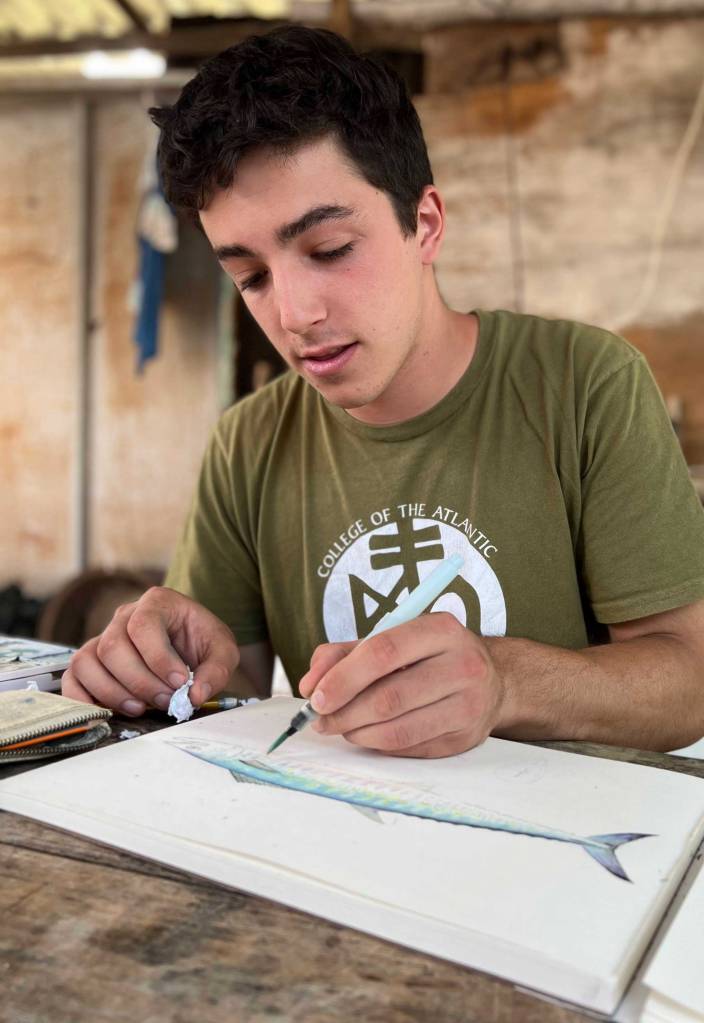
Massimo Hamilton ’24. I love fish, fishing, and seafood. I grew up by a beautiful stream that gave me my passion for fish. In my first year at COA, I was fortunate to be given a job working on the college’s waterfront as crew on Osprey, which encouraged my further explorations of marine opportunities at COA. I have taken classes such as Marine Biology, Blue Food Systems, and Fisheries Fishermen and Fishing Communities. For my final project in the Yucatan Program, I spoke with fishermen, documented their stories, and painted watercolor portraits of 15 species of fish that I ate during my time in a coastal community. I was fortunate to take part in Sea Education Association’s Climate and Society program. On this voyage, I completed a research project on traditional community fisheries management practices in Polynesia. I interned for the Bar Harbor Marine Resources Committee, where I worked on a project to understand the local recreational shellfish fishery better. I also spent the summer working on a local oyster farm, experiencing the grueling hands-on work of a practice that provides a positive opportunity for coastal communities and the natural environment.
For my senior project, I am making a recreational fishing guide and cookbook on the seafood of Mount Desert Island and the Maine Coast. I am illustrating it to make a beautiful book that clearly explains the fishing and seafood opportunities in the area. The book is organized by species and includes personal opinions and experiences, the biology and ecology of the fish, the history of the fishery, fishing methods, advice, fishing regulations, local fishing locations, how to gut and clean the species, and a few recipes or cooking techniques for each. Some recipes are from my family and childhood, and others will be ones I have found or invented in my time at COA. My book is a way to share the knowledge of and appreciation for the recreational fishing experiences that I have so enjoyed in my time at COA. The book celebrates the seafood of MDI.
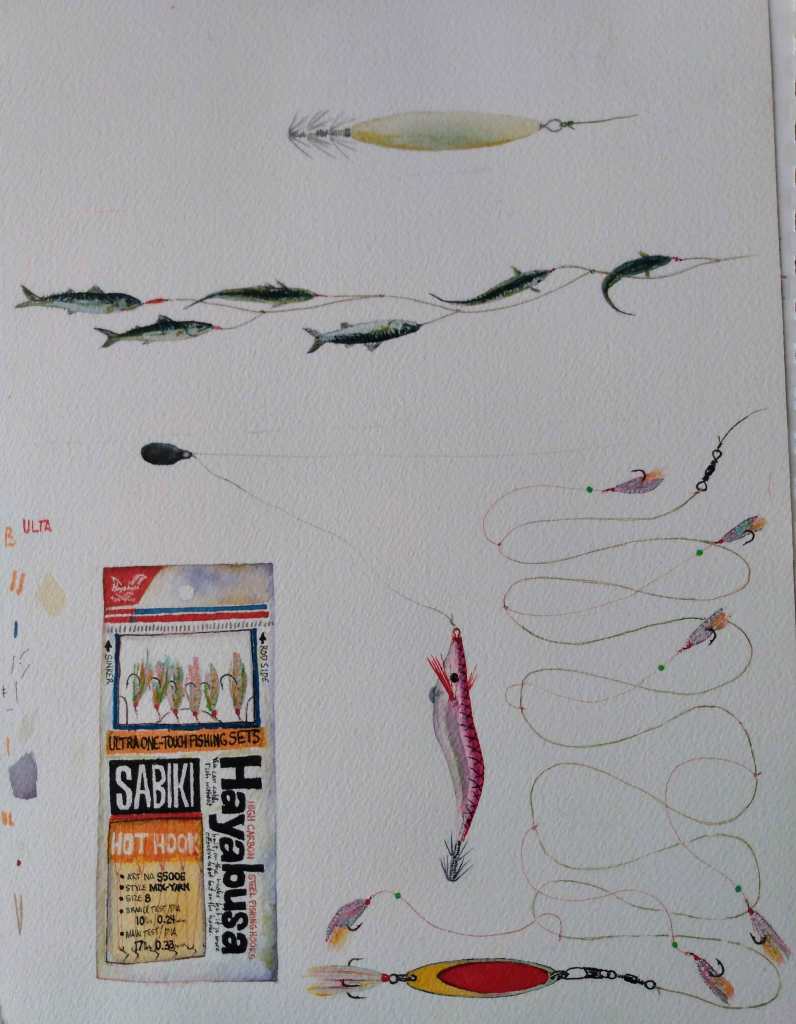
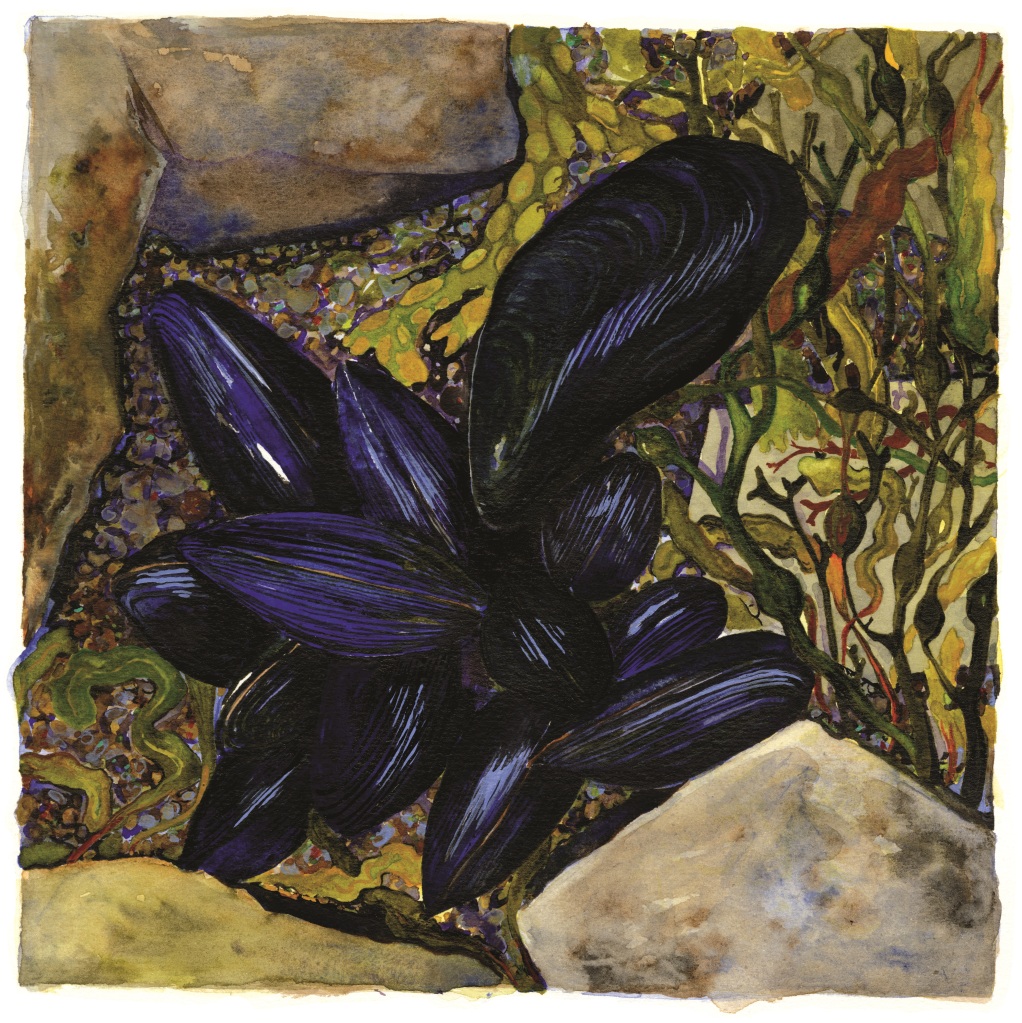
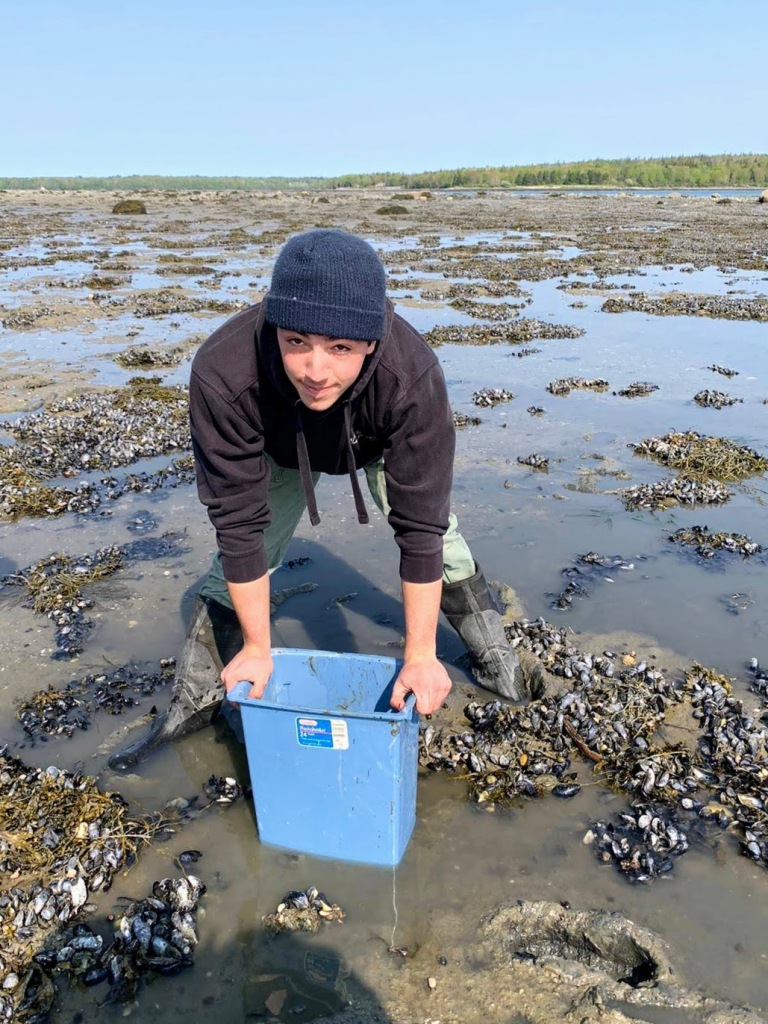
I chose this project as one that combines many of my passions, interests, and skills. In my time at the College of the Atlantic, I really enjoyed fishing and harvesting in the waters of Mount Desert Island. I have learned much and would like to share the information with others. I am also interested in visual art, communication, and design, and really enjoy painting fish. My senior project combines these two in a way that gives back to the community.
Images clockwise from the top: Lures and fish, mussels, Massimo harvesting mussels, quahogs and pasta.
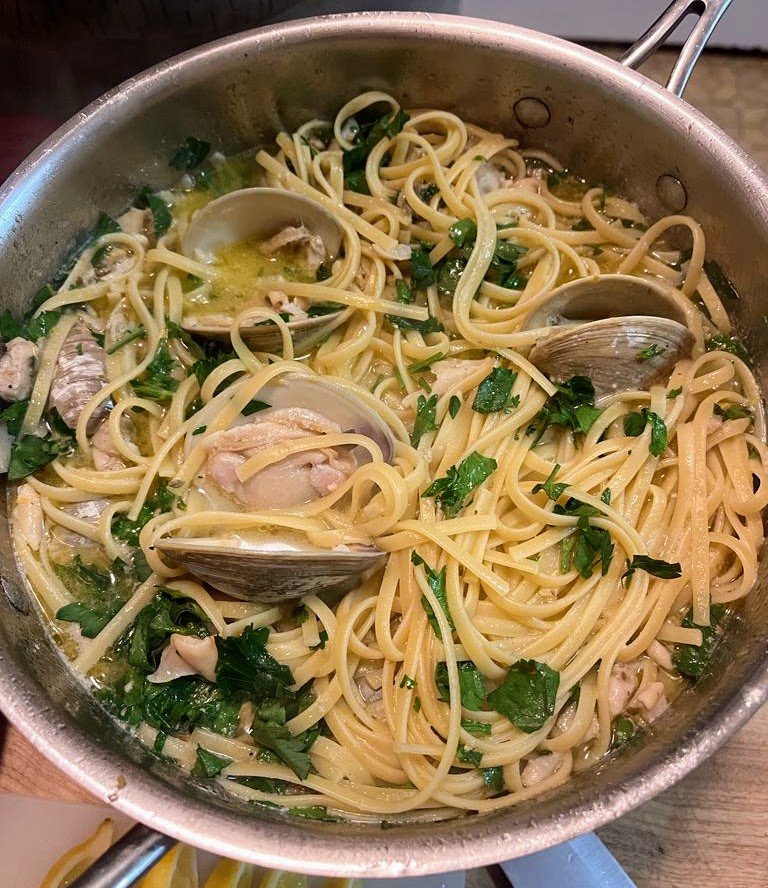
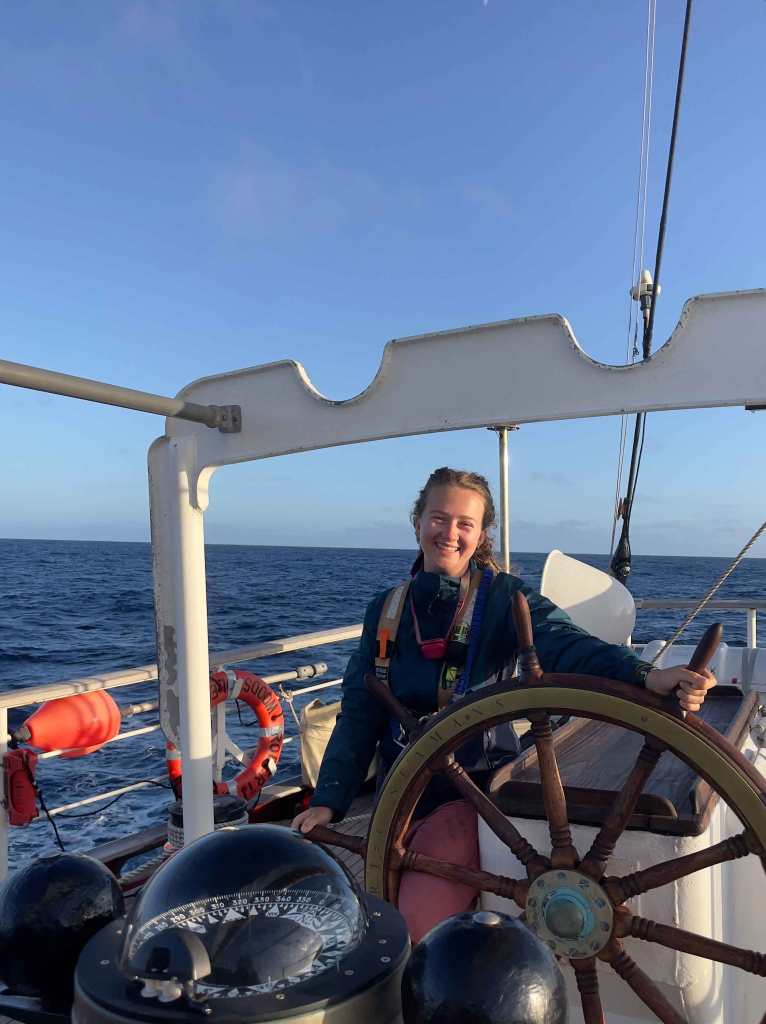
Emily Rose Stringer ’24. I love the ocean, so naturally I took Marine Biology during my first term at COA. Our marine biology course broadened my science background and encouraged me to pursue marine studies and research. As an in-person course during the pandemic (Fall 2020) this course provided me with much-needed connection. For me, marine studies have since proved to be all about connections –ecological, biological, and social. For the next two years I was a teacher’s assistant for the course. In this role I shared my knowledge of and passion for our local marine environment, and supported the course’s research efforts – primarily clam recruitment surveys and invasive green crab surveys.
Left: Cruising the South Pacific as part of Sea Semester. Below: River herring swimming upstream to spawn in lakes in Maine in the spring
Over the summers I have had three amazing internship and employment opportunities here in Maine. My first summer in 2021, I spent the season at the college’s Alice Eno Research Station on Great Duck Island. I assisted another student in her research on the regeneration and health of the spruce forest. and also helped with research and learned about the biology of Leach’s Storm petrels and gulls. The next summer I worked for a local tour boat company in Frenchman Bay. I was a naturalist on seabird and lighthouse tours, and I crafted a narrative to introduce tourists to our marine ecosystems, cultural history, and local seabirds and marine mammals. I also was a deckhand aboard a fishing tour boat out of Bar Harbor where I spent time fishing (see the cod picture below), educating tourists on our local fishes, and cleaning the catch. The majority of my work has been conducted in the Gulf of Maine, I also did a semester with Sea Education Association (SEA) in the South Pacific Ocean. I sailed on a tall ship and conducted baseline climate and oceanographic research between Fiji, Tuvalu, and Aoteoroa New Zealand. This experience broadened my knowledge of marine studies and global systems and contextualized my work at COA.

Last summer I worked as an intern for the River Herring Network (RHN) and was based downeast in Machias. I conducted zooplankton tows and went night seining for juvenile alewives on the Bagaduce waterway and helped to create an interactive RShiny portal application to visualize east coast fish runs. This app is a collaboration between the RHN and the Mid-Atlantic Fishery Management Council. The overall goal of the app is to allow visualization and sharing of east coast river herring and shad run fish count data, and to serve as a communications tool to build a greater shared understanding of the status of river herring coast-wide.
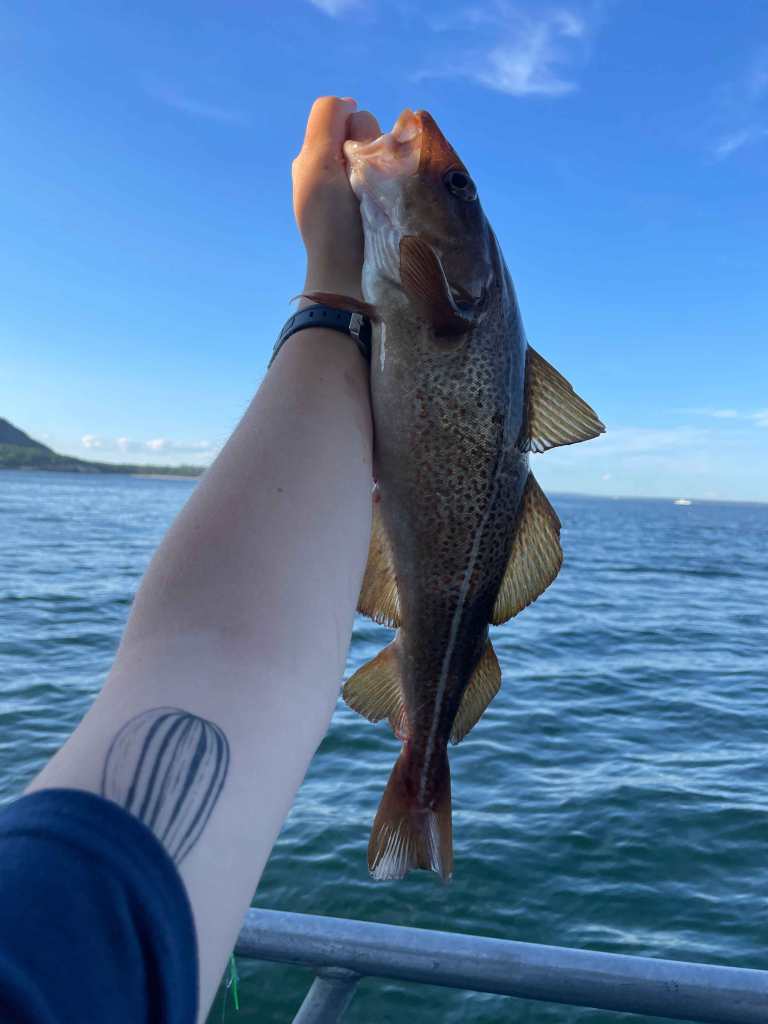

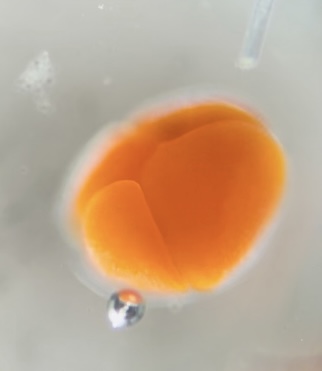
An Atlantic cod caught during a tourist fishing trip, me driving the boat and a 4-cell larvae of a orange footed sea cucumber (about the size of a head of a pin).
While at COA, sea cucumbers have been the primary focus of my research. Orange-footed sea ucumbers (Cucumaria frondosa) are a commercially important marine invertebrate present in our local waters of Frenchman Bay. Each spring the sea cucumbers spawn and the developing larvae are dispersed by current movement before settling. One cold spring day during my first year, I helped Chris and a few other marine studies students take a plankton sample at the Bar Harbor Town Pier. We were looking for sea cucumber larvae. I didn’t know what to expect, but after seeing the first sea cucumber larva I was hooked! Sea cucumber larvae are approximately the size of a poppy seed, bright orange in color, and lecithotrophic, meaning they are fatty and non-feeding larvae.. During my second and third years I assumed responsibility for the spring plankton tows and collection of larval data, and now the analysis of the entire ten-year data set is the focus of my senior project, I am currently visualizing and analyzing our project’s data.
Katie Culp ’24. My path through Human Ecology these past four years has mostly revolved around studying coastal communities, coastal resilience, and maritime anthropology through the lenses of work, food, and language. I am fascinated with storytelling and memory as they relate to people and water. I am drawn to the concept of water holding memory, culture, and traditions, and these interests have guided much of my educational path. Through my future work I wish to emphasize storytelling as a tool for preserving cultural heritage and coastal community resilience while underscoring local knowledge and lived experience on issues affecting coastlines.
Right: In Glacier Bay National Park in Alaska with the Williams-Mystic program exploring the rocky intertidal.
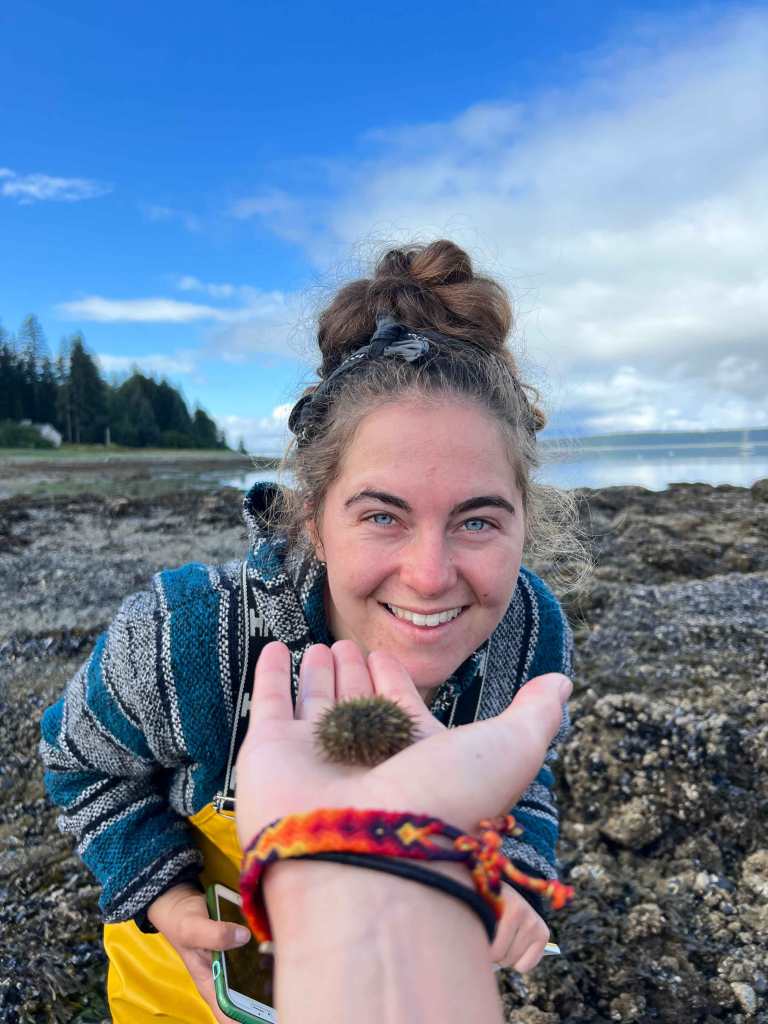
I have had the great privilege of hearing individual perspectives from a variety of different coastal community members through the oral history projects I have been fortunate to work on during my time at COA. These projects were the Frenchman Bay Oral History Project, an offshoot of the broader Mapping Ocean Stories Project (a collaborative project through Maine Sea Grant, COA, Island Institute, and The First Coast) and my senior project, an oral history collection of San Crisanto, Yucatán, MX. Through working with Mapping Ocean Stories I learned valuable tools for oral history collection and community interaction that I was able to apply to my senior project. Both of these projects aim to document the lived experience of people who have spent a significant amount of time working on the water or (in terms of my senior project) with coastal and marine resources. The Frenchman Bay Project also included a mapping component that identified historically and currently relevant places on the bay for working waterfronts and fisheries. These projects have allowed me to gain confidence speaking with a variety of people with different backgrounds and have increased my knowledge of various issues and dynamics at stake in various coastal communities. Through my experiences working in San Crisanto and on the Frenchman Bay Oral History Project, I have realized my passion for recording the stories of coastal community members as a way to learn from perspectives that are grounded in a place-based and culturally-rooted understanding of an area.
I am also interested in studying coastal communities from a policy perspective. While participating in an interdisciplinary study-away program called Williams-Mystic, I worked on a Marine Policy project where I interviewed stakeholders in the state of Maine regarding current policy measures pertaining to the North Atlantic right whale and the Maine lobster industry. I loved working on this project because I had the opportunity to learn from a variety of stakeholders about their perspectives on a critical marine policy issue for the area. I would love to continue grounding my study of coastal communities in vital conversations about the intersection between marine policy, blue food systems, and cultural heritage. I also just returned from the Sea Education Association’s Climate Change and Coastal Resilience Program in Aotearoa New Zealand this past term with four other COA students.
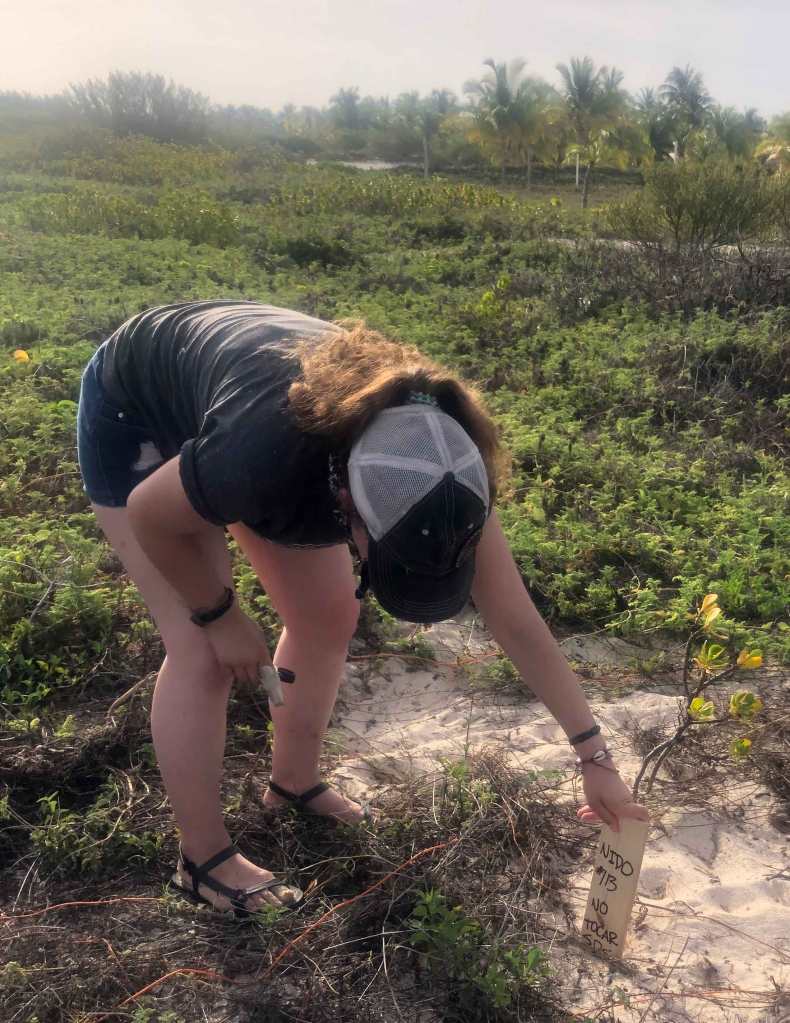
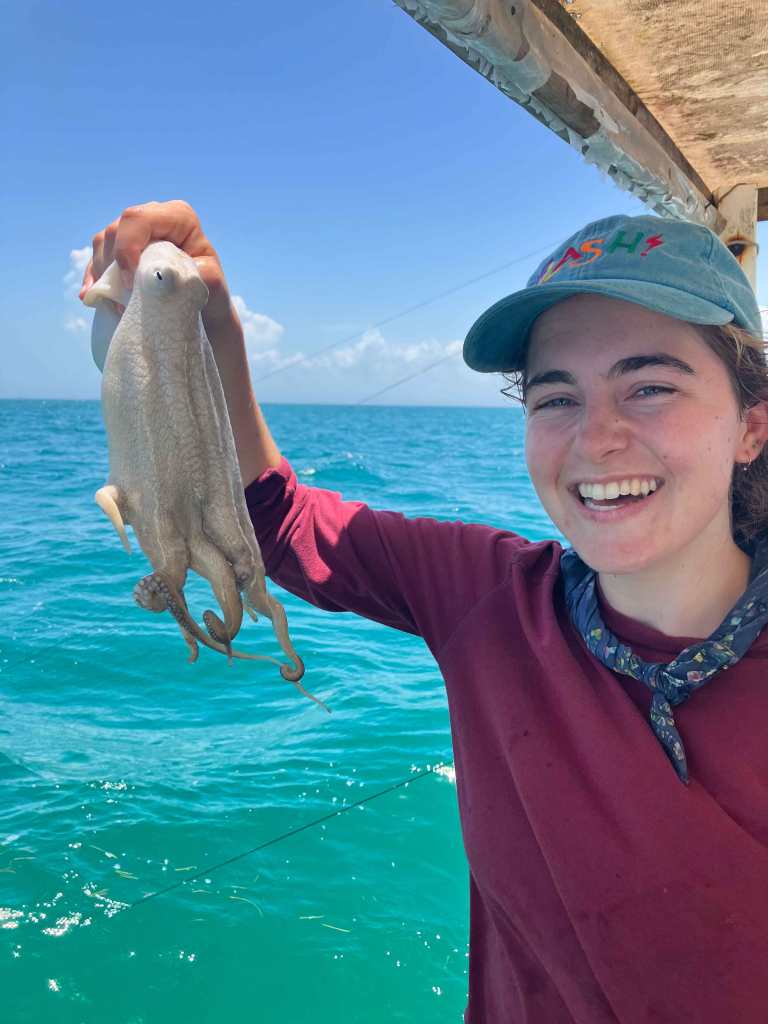
Left: On the beach in San Crisanto marking a hawksbill sea turtle nest. I was volunteering with Club de la Tortuga Telchac Puerto, a local sea turtle conservation non-profit. I fished octopus with my host family as part of the oral history collection I did for my senior project in San Crisanto. I interviewed community members about their connections to the ocean and to the community/place, and talked to people about changes they have witnessed to the ecology of the area, as well as to their jobs and ways of life. I went octopus fishing to get a feel for what is currently the main fishing industry there.
edited by COA faculty member Chris Petersen

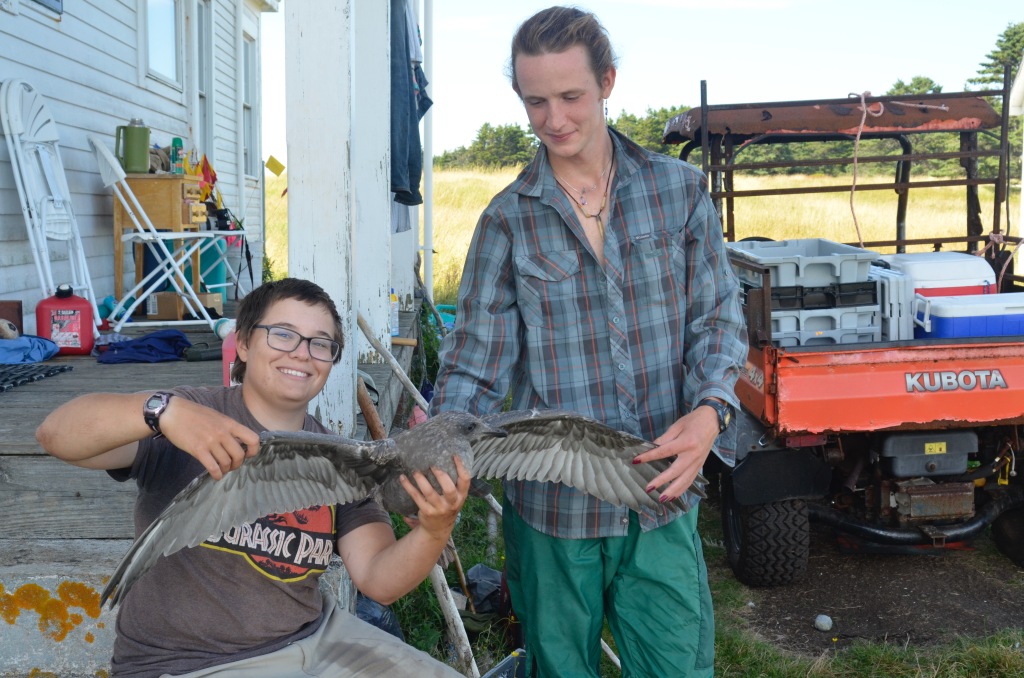
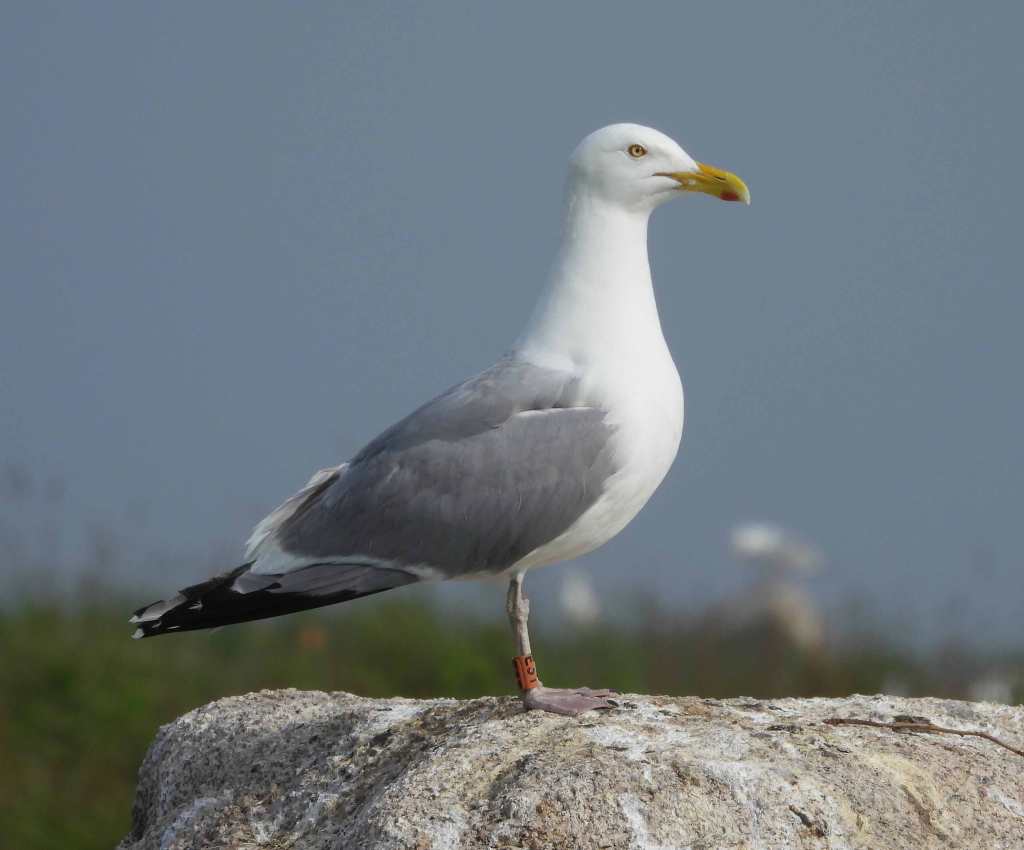
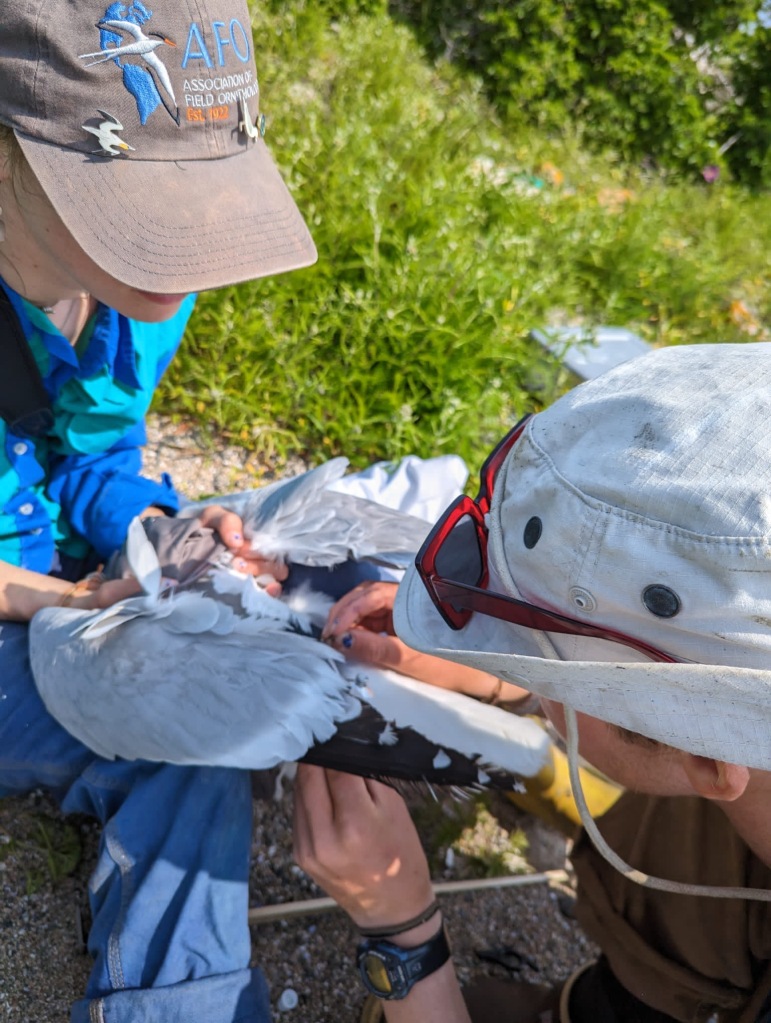
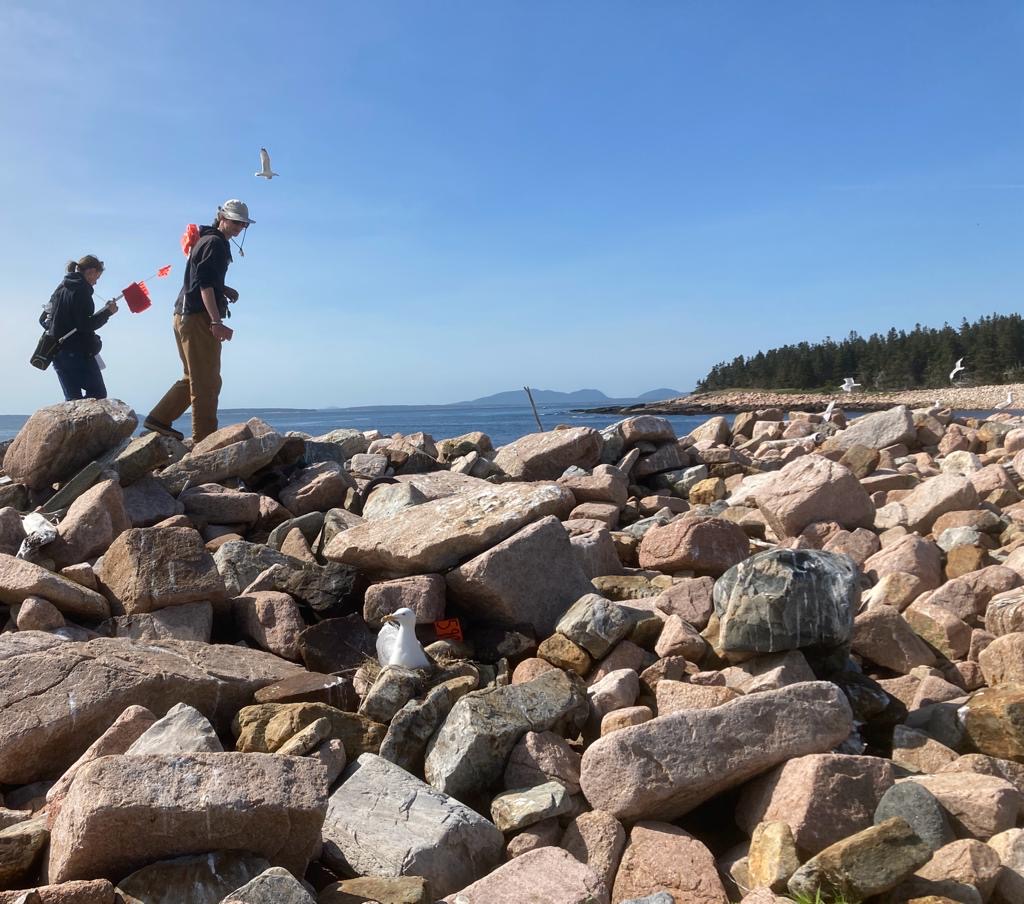
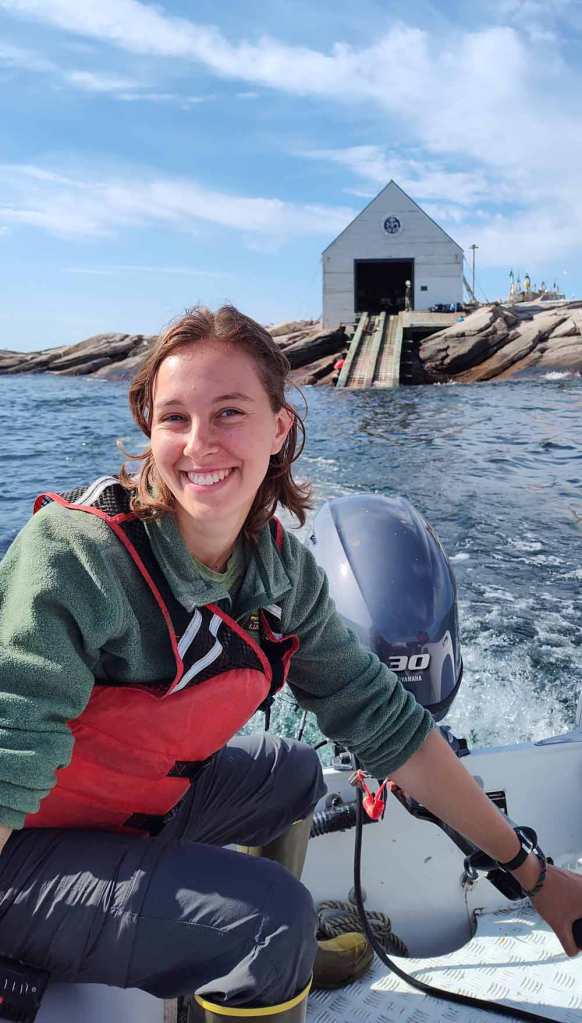
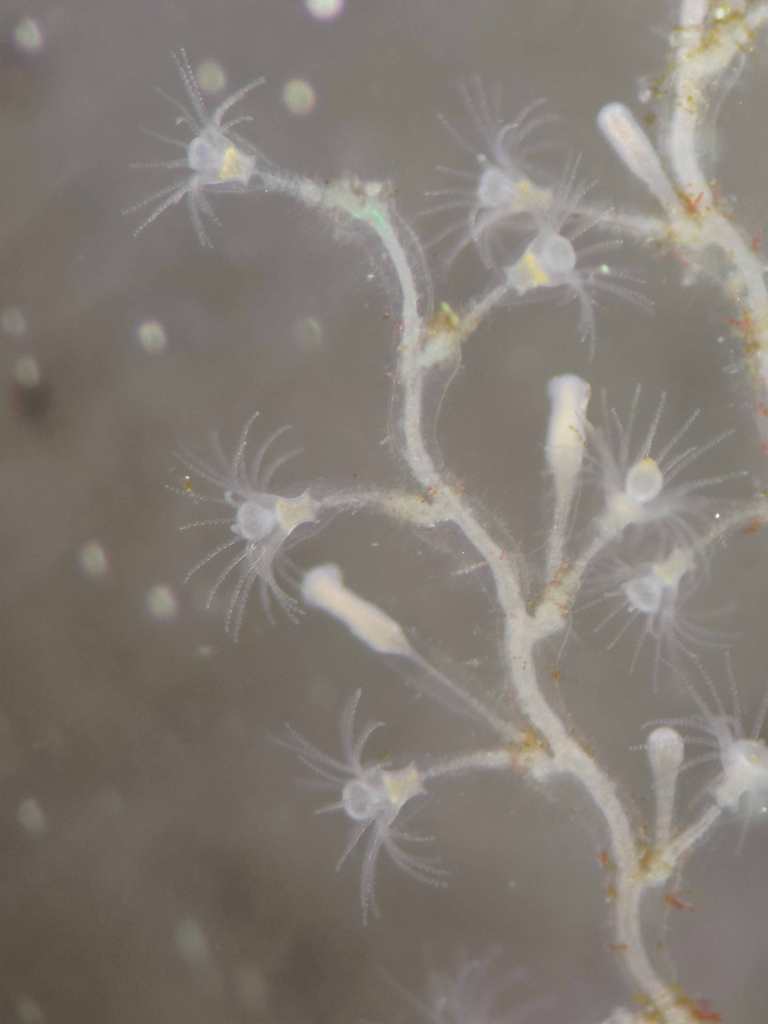
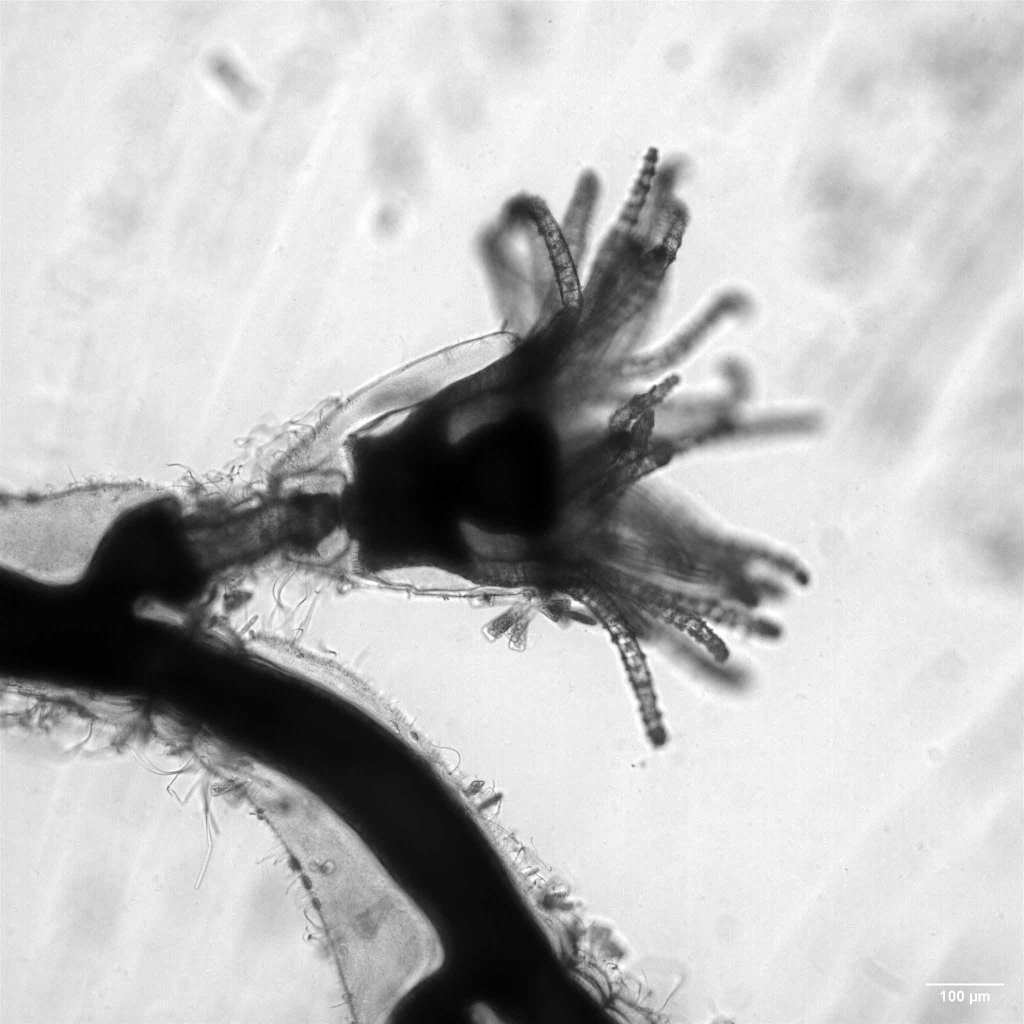
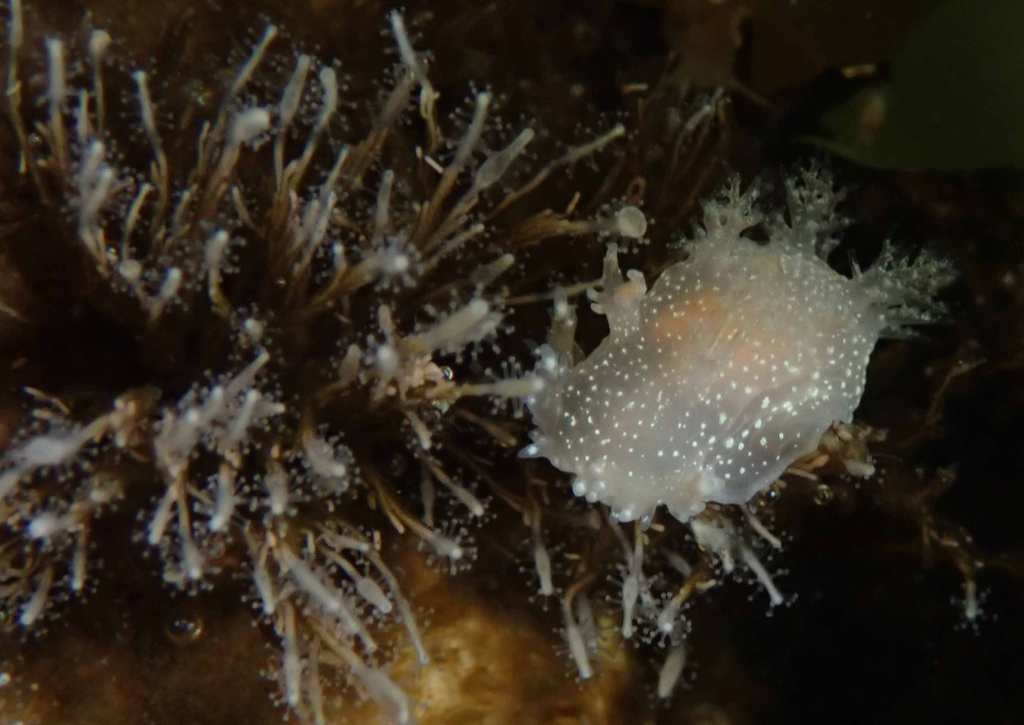
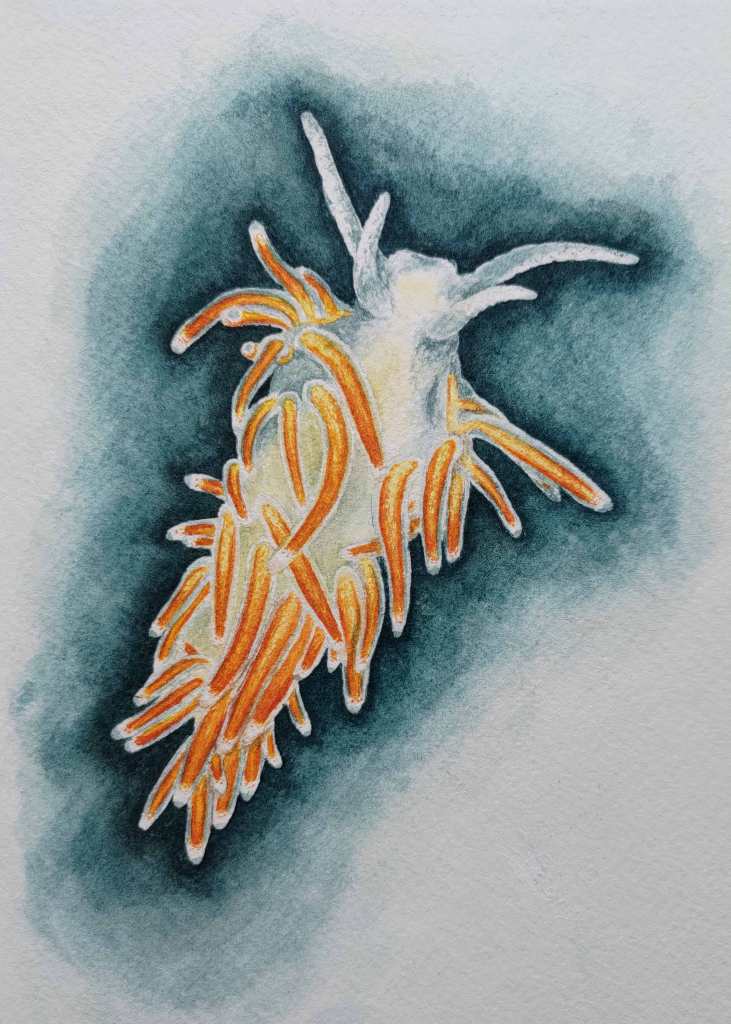
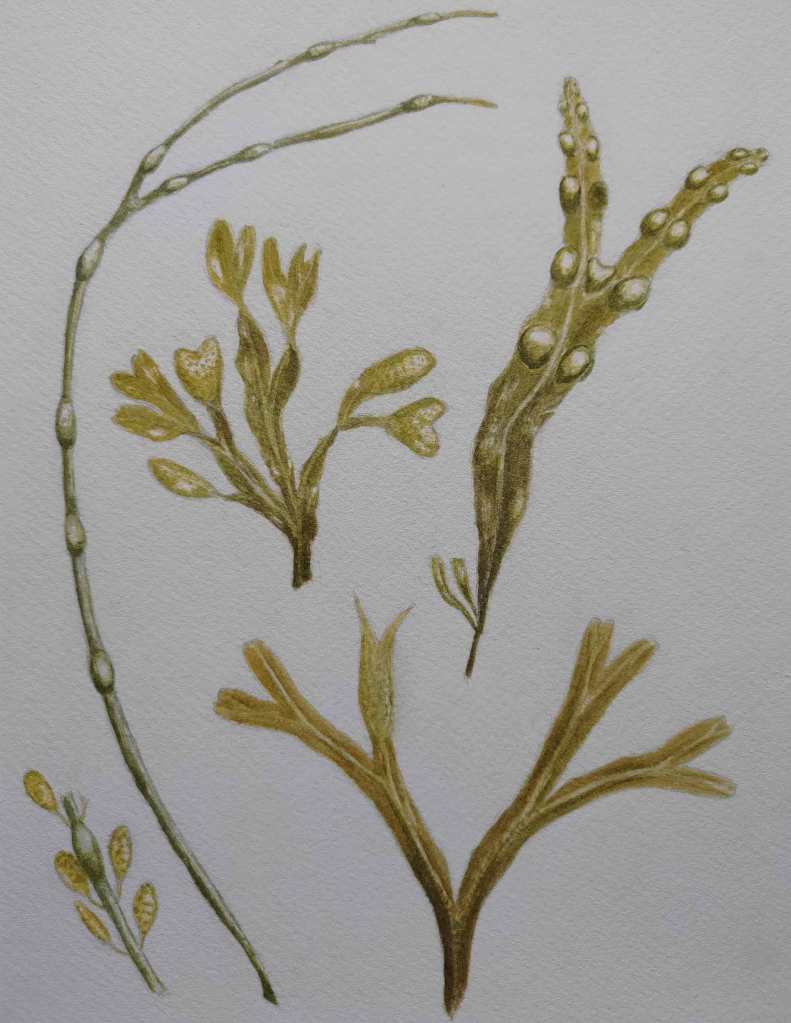
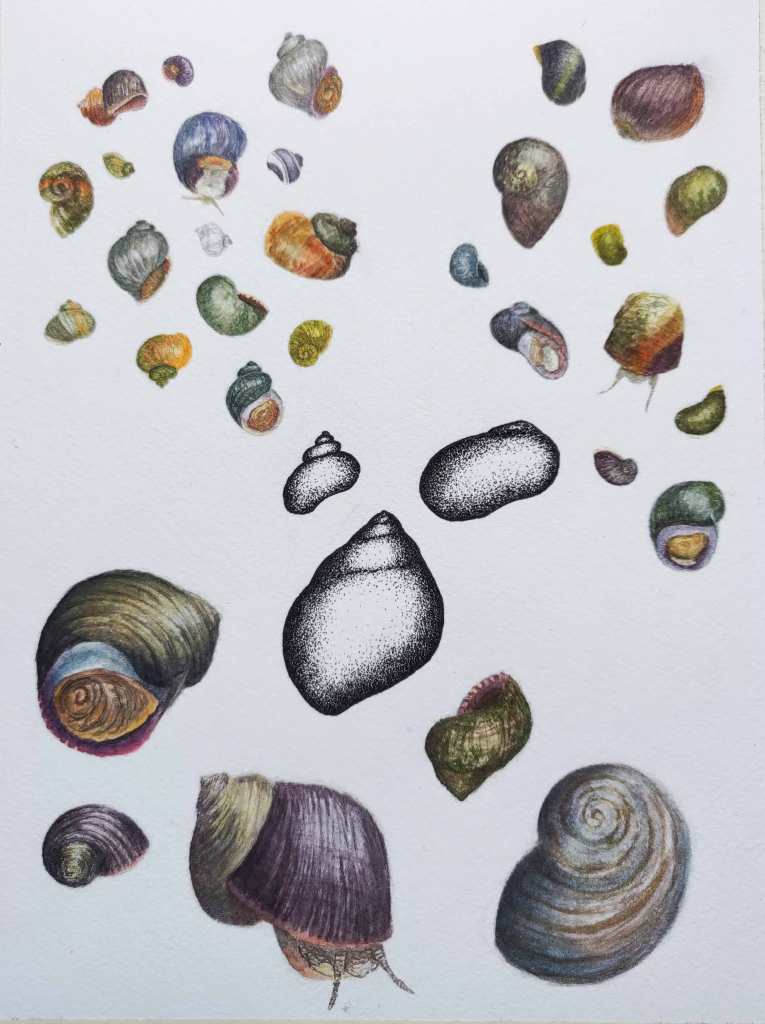
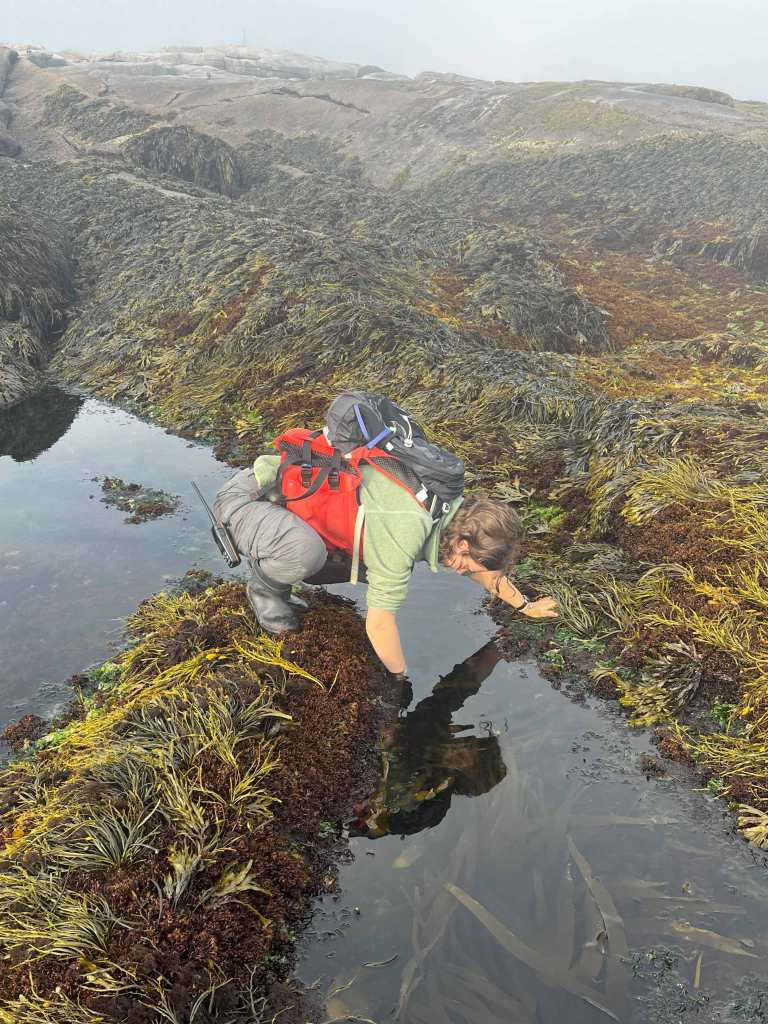
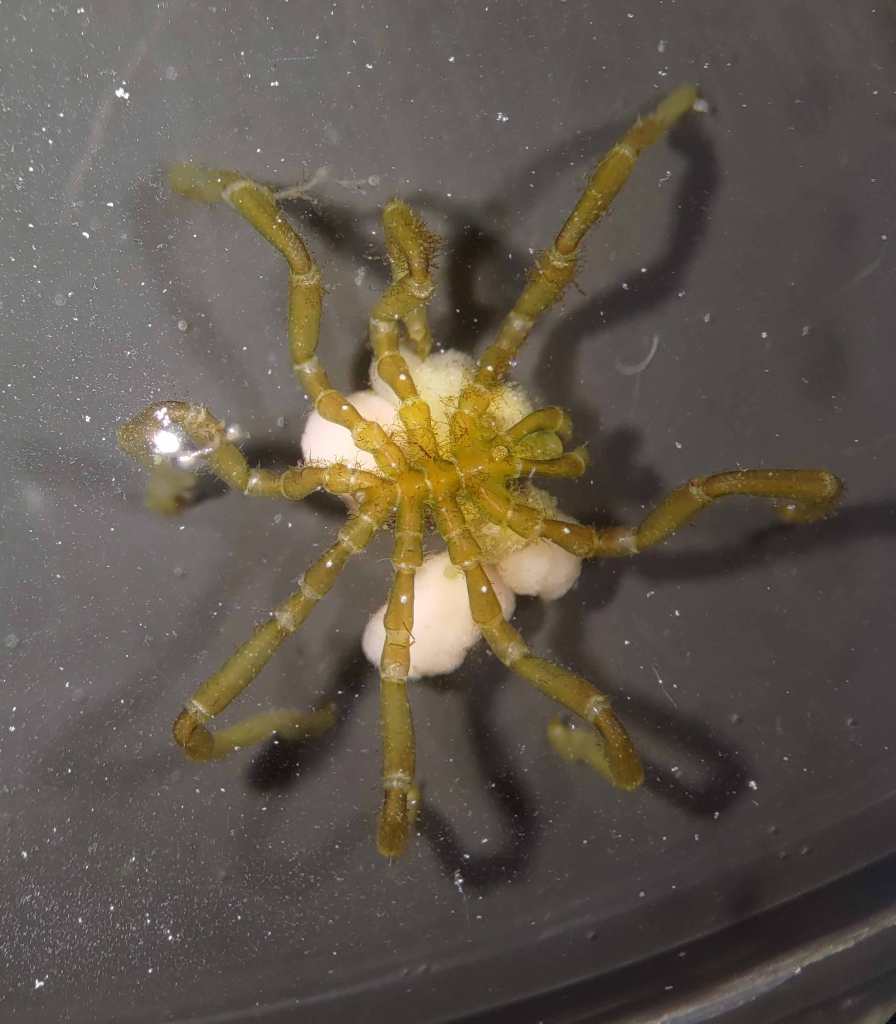
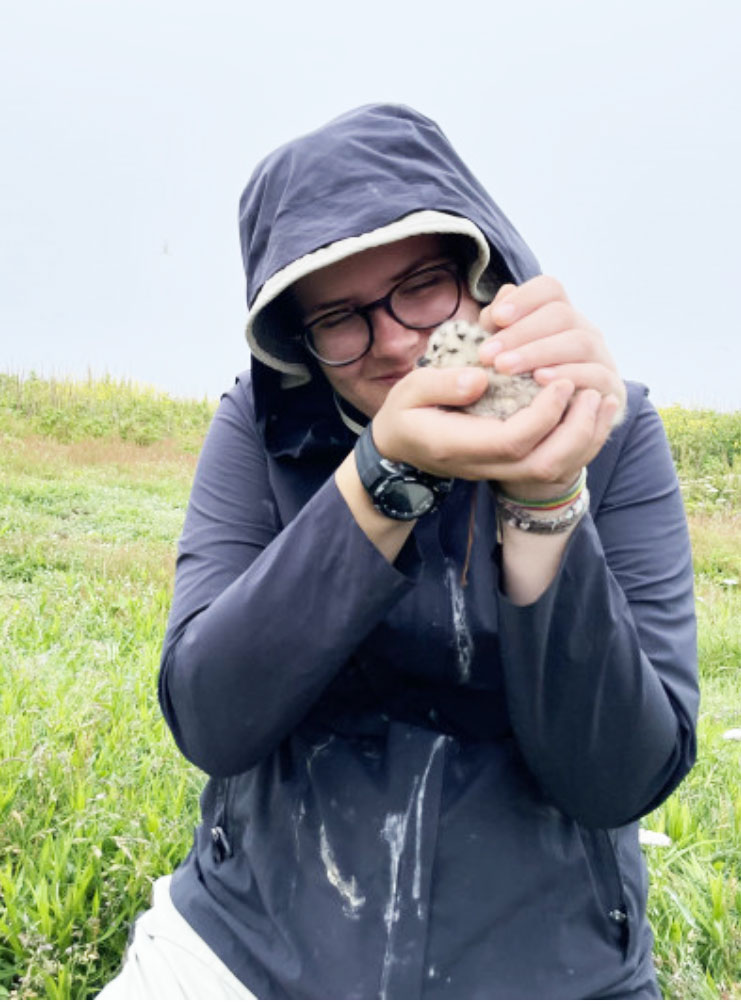
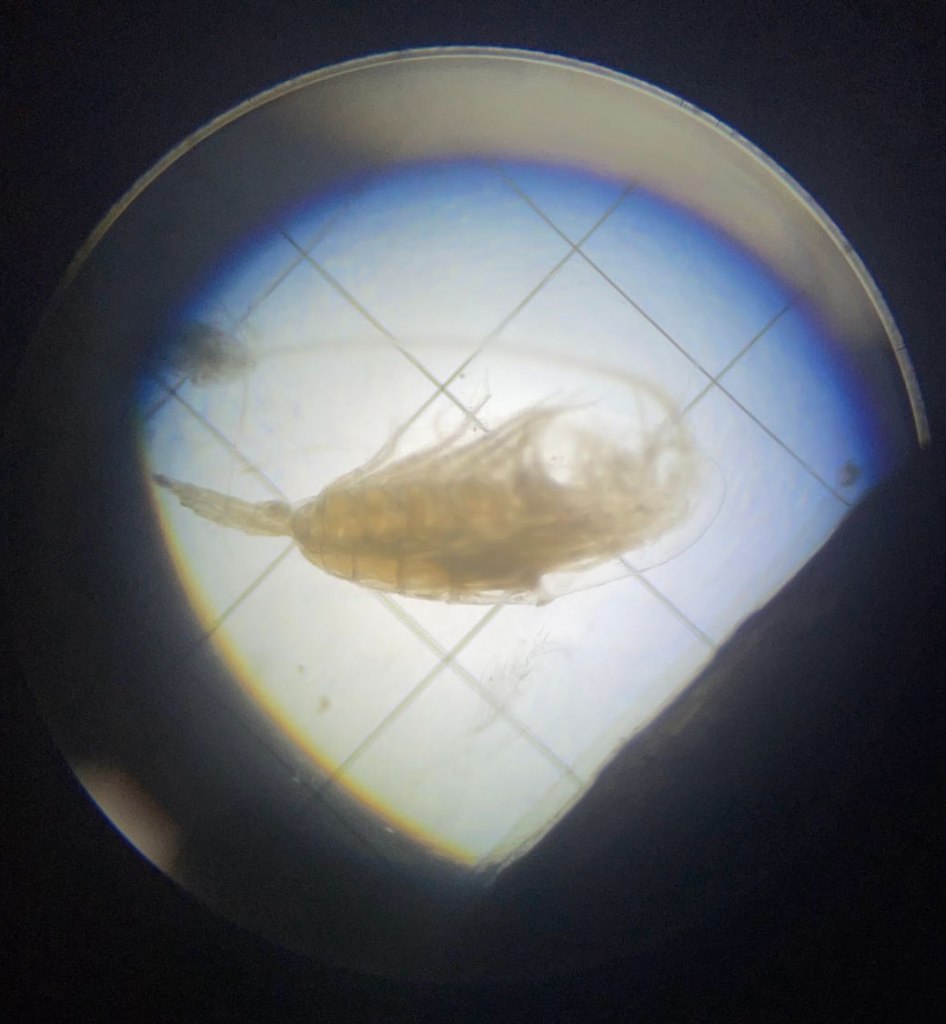
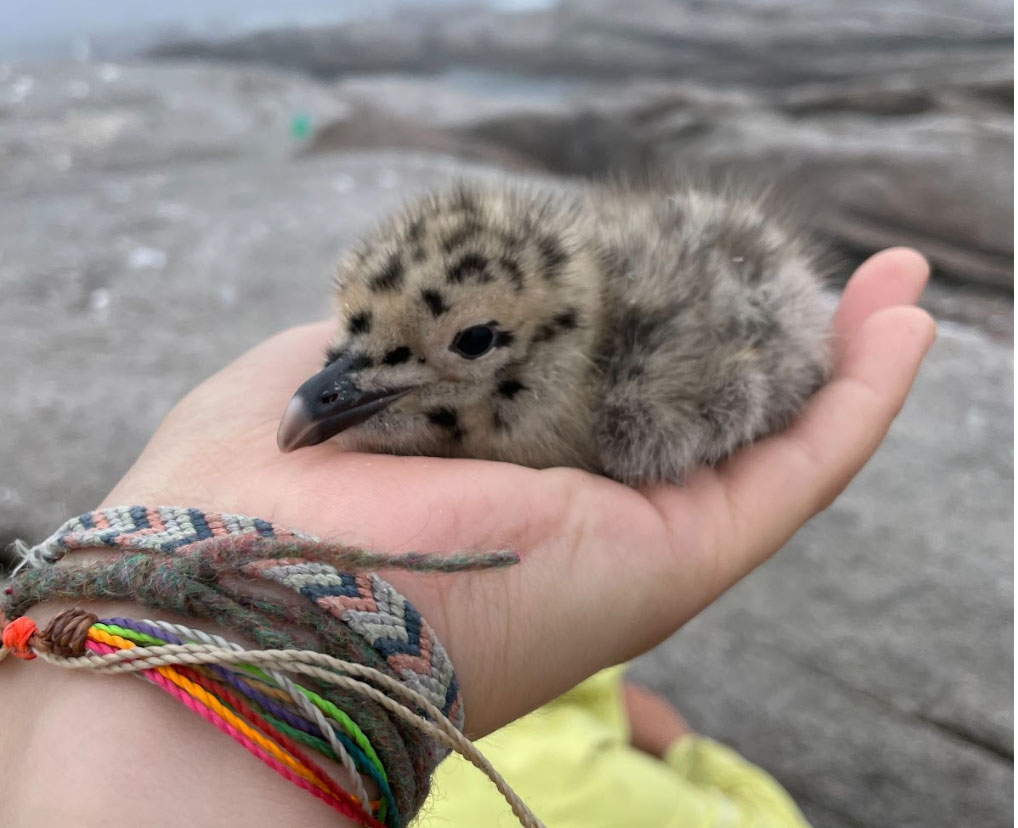
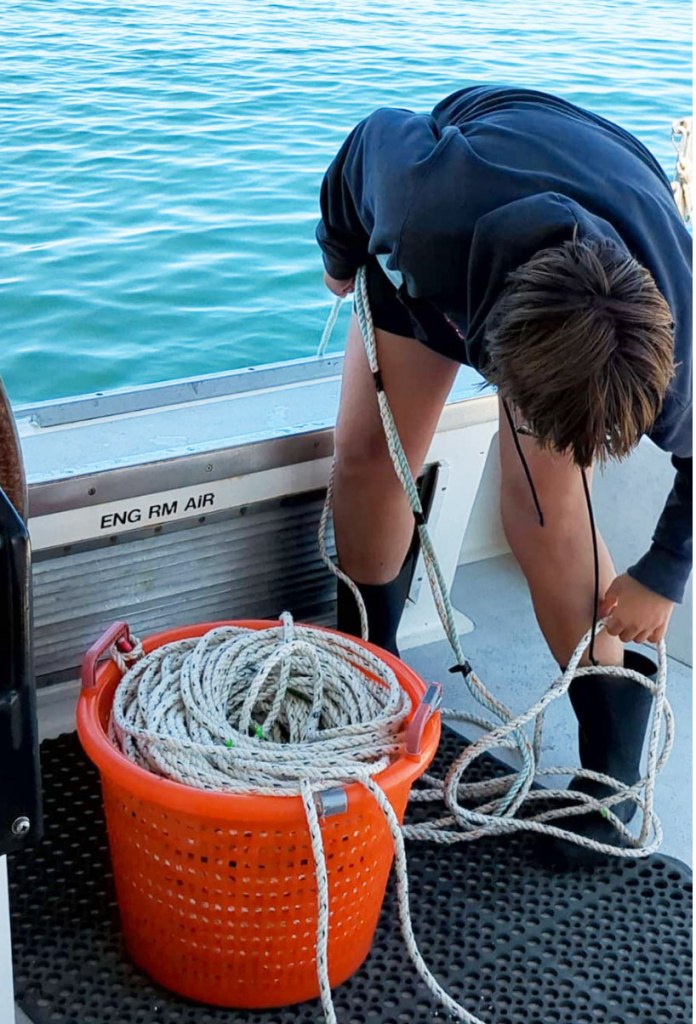
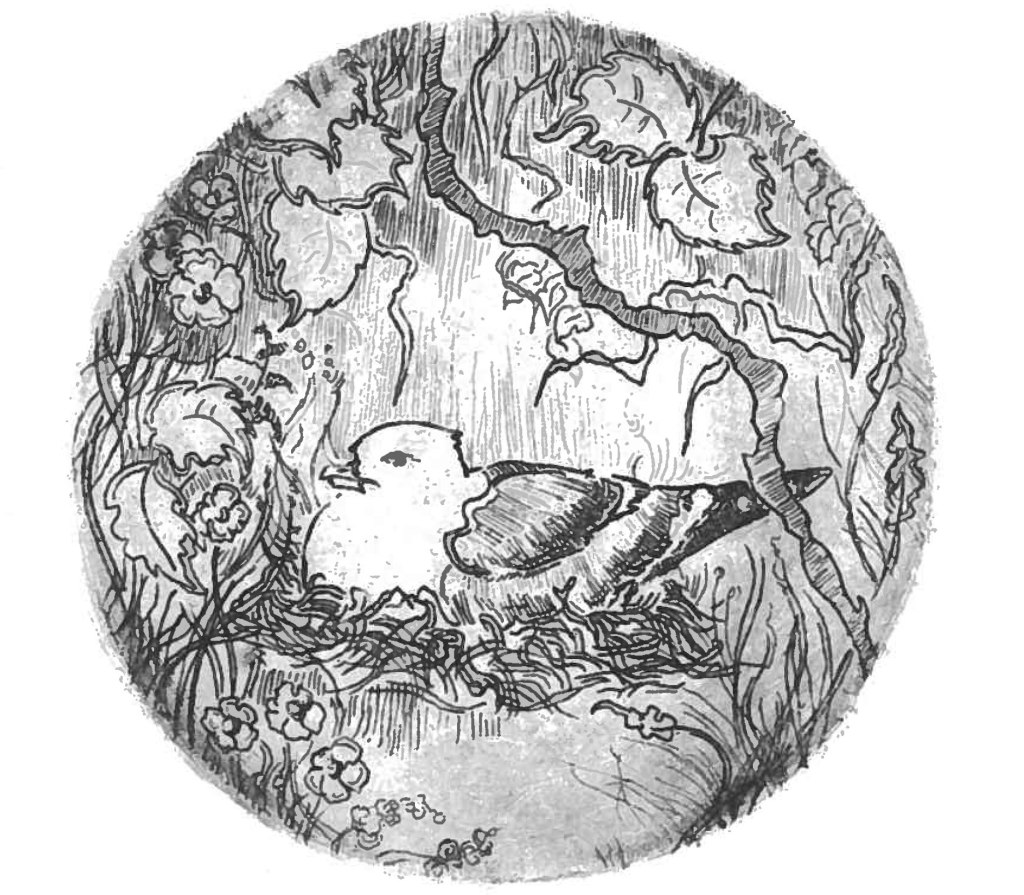
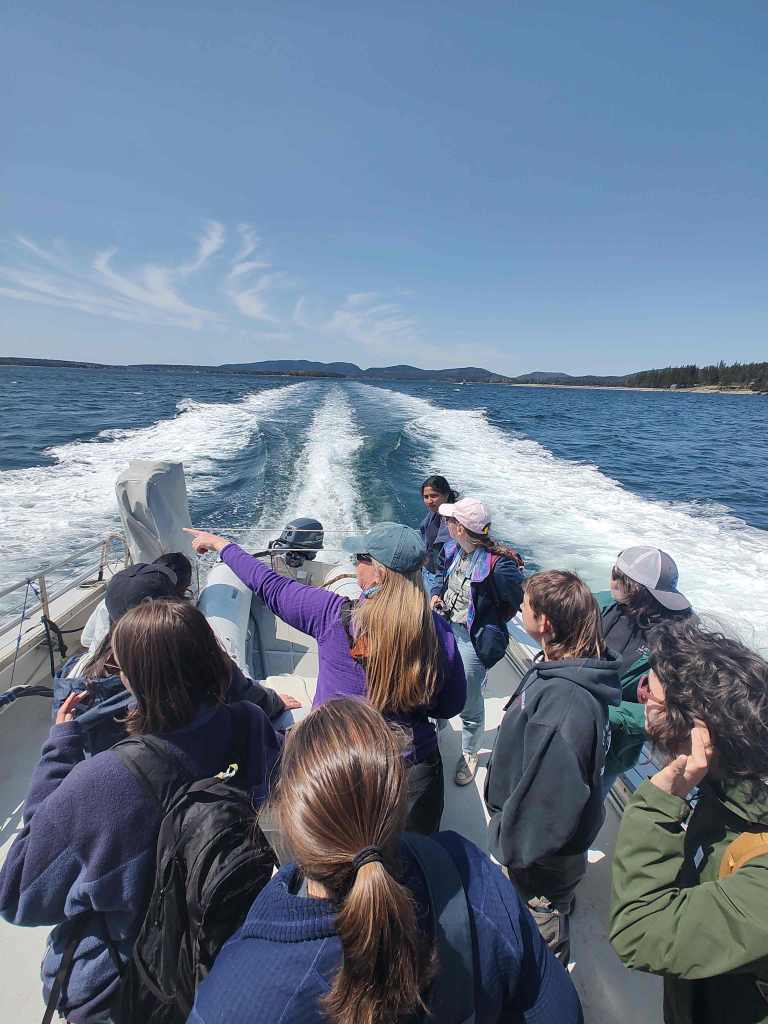


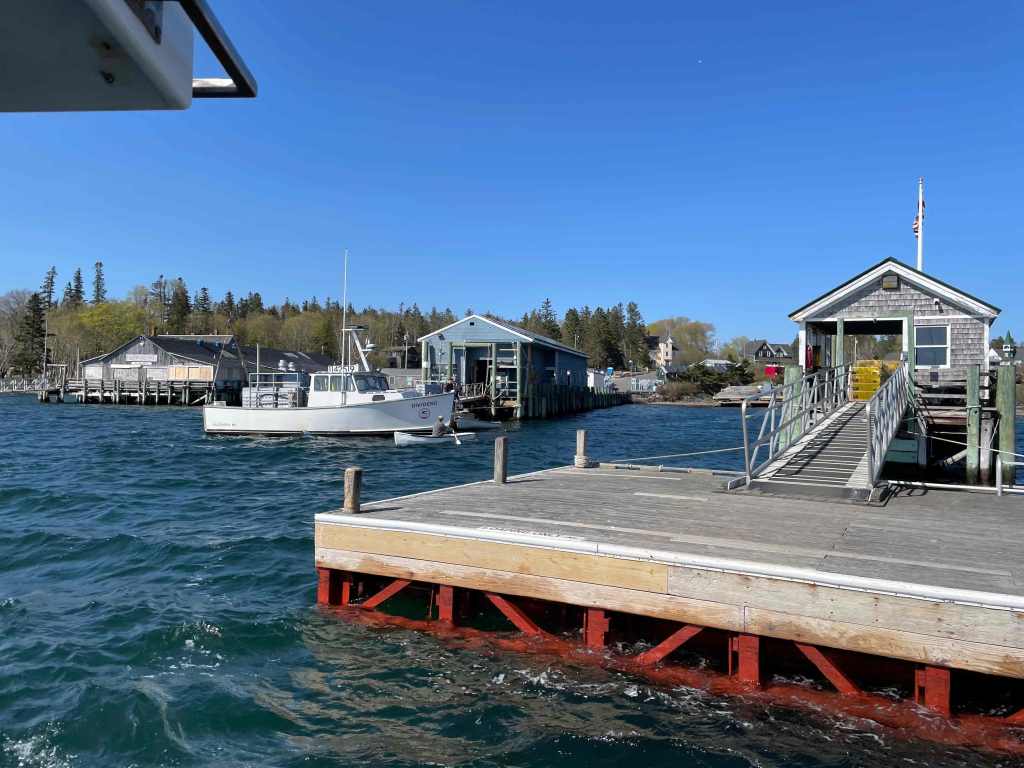



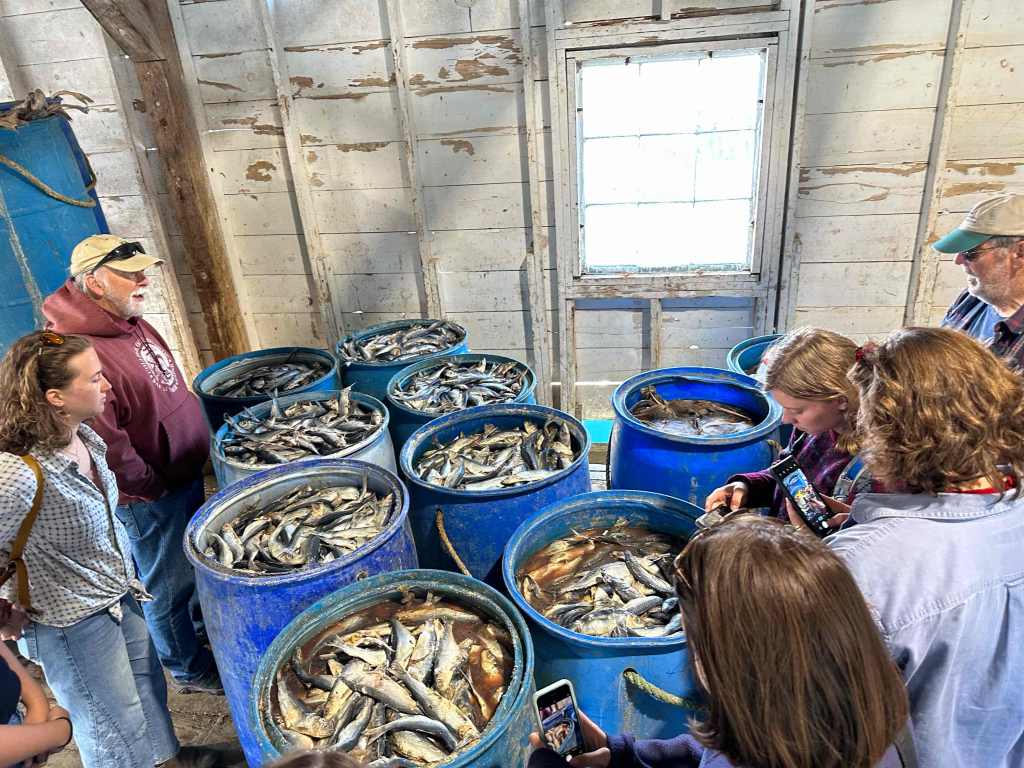
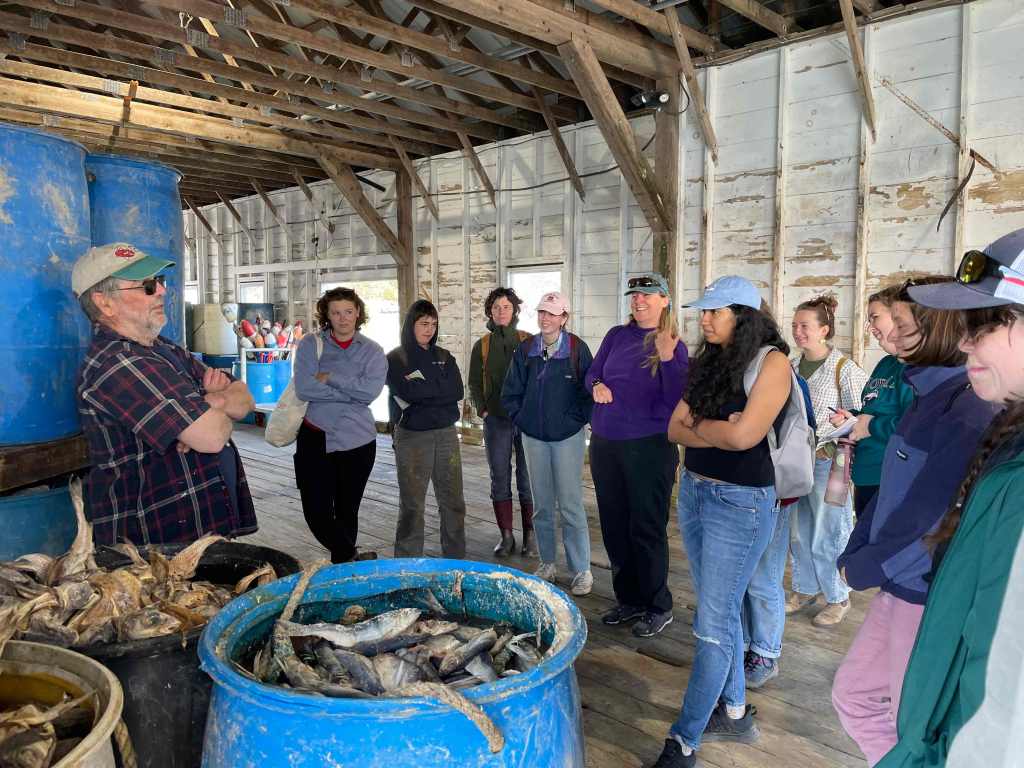



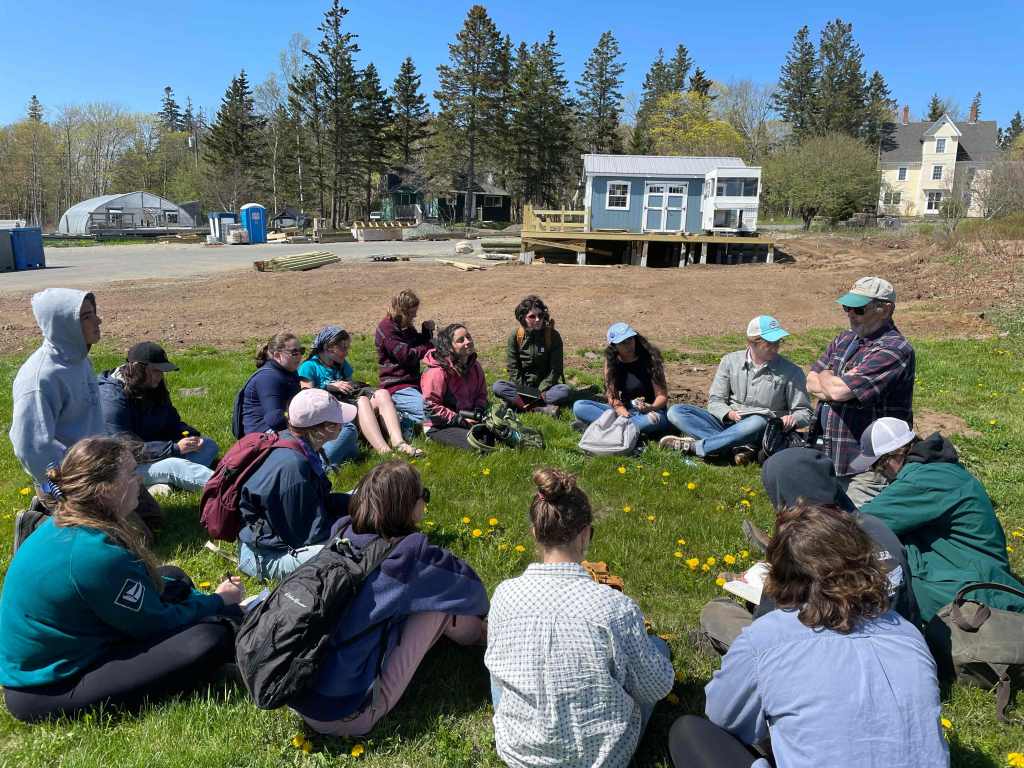
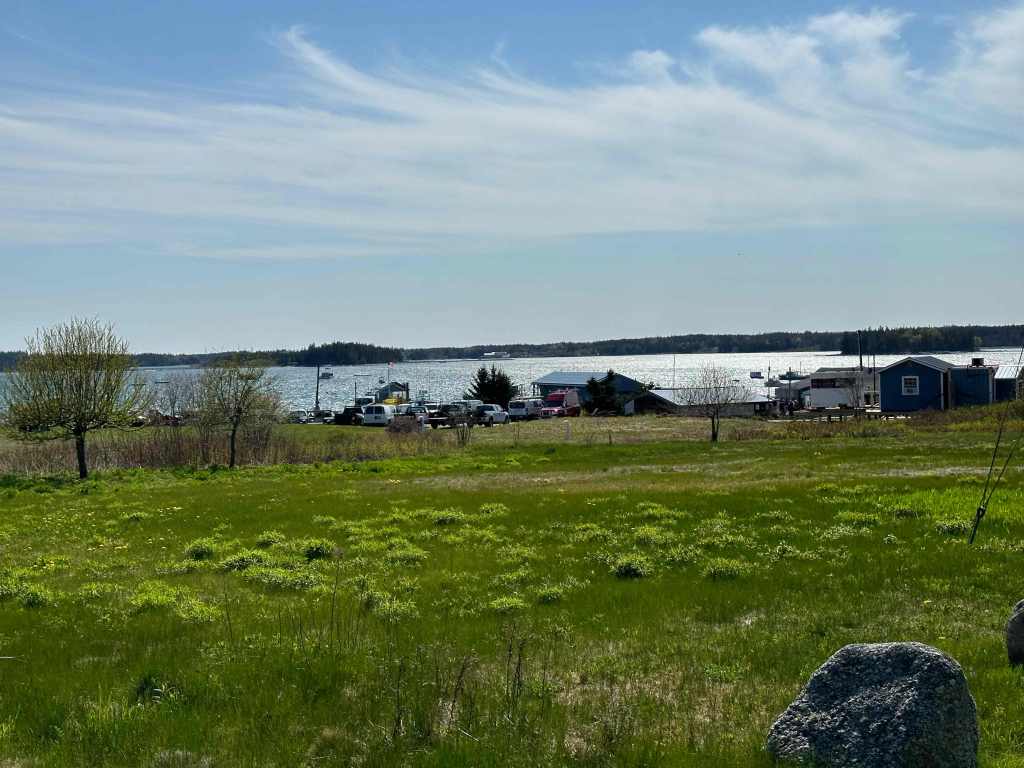



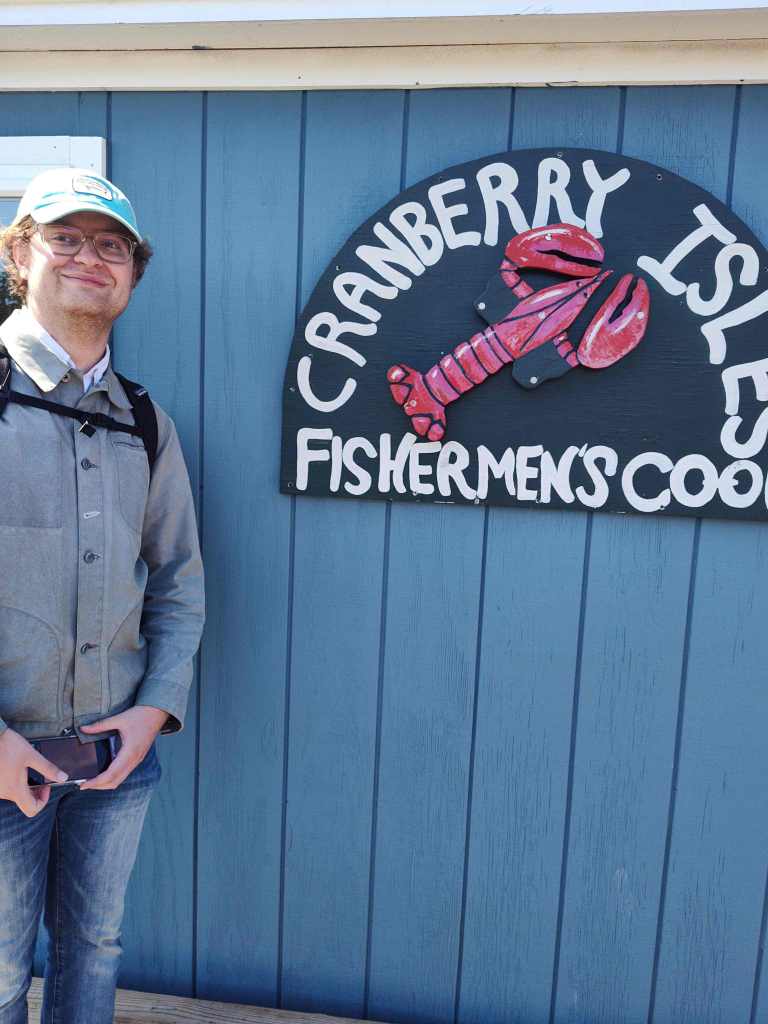
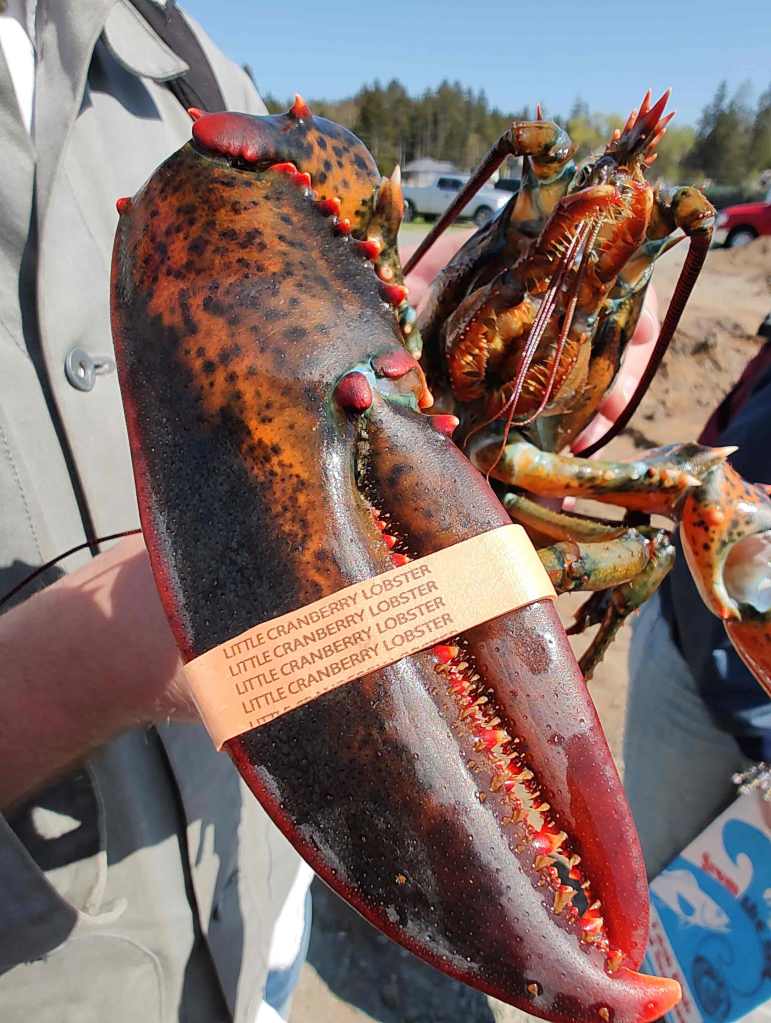

























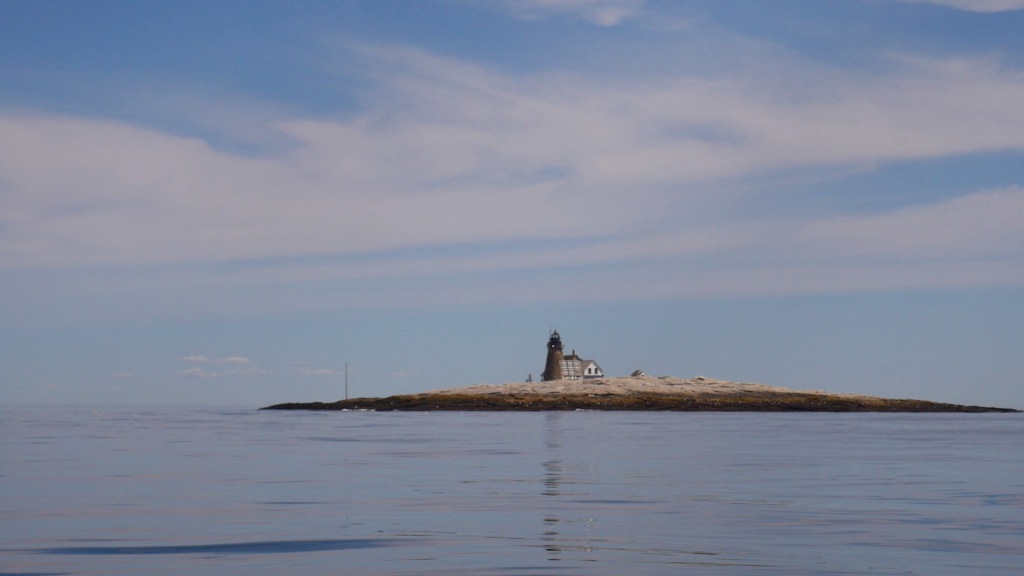













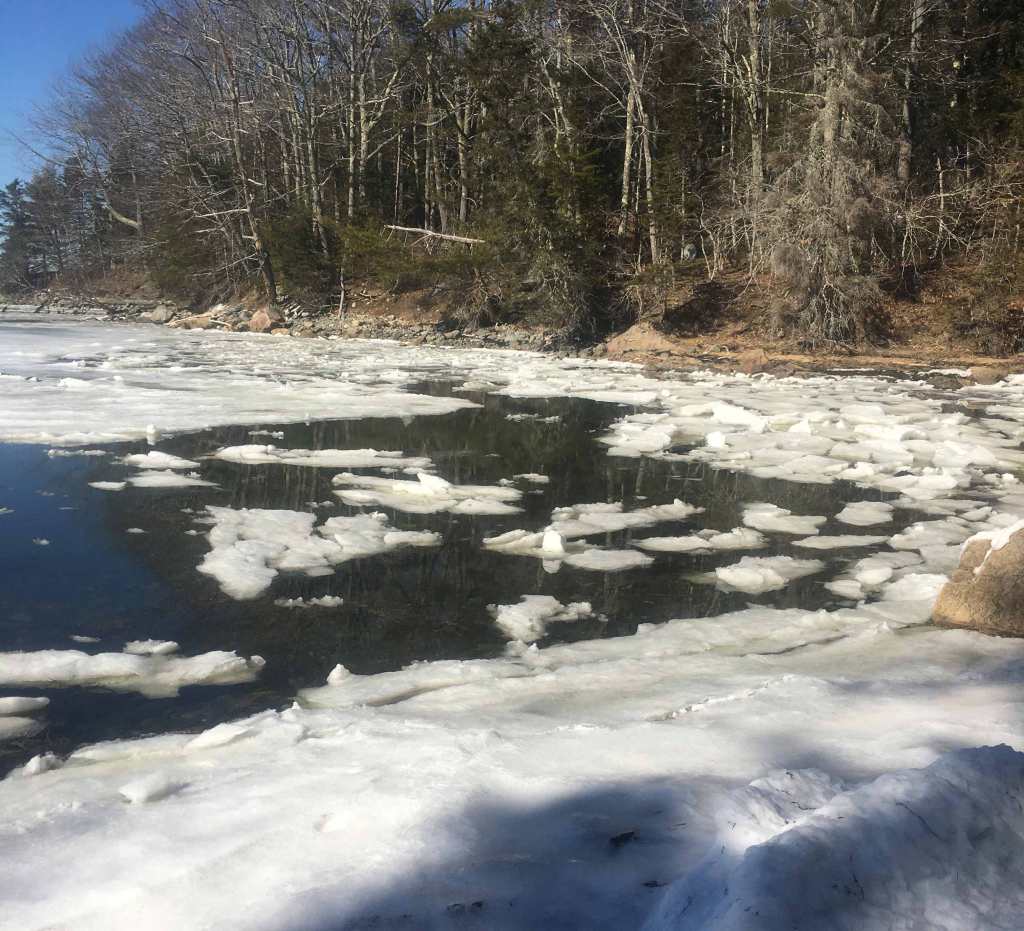










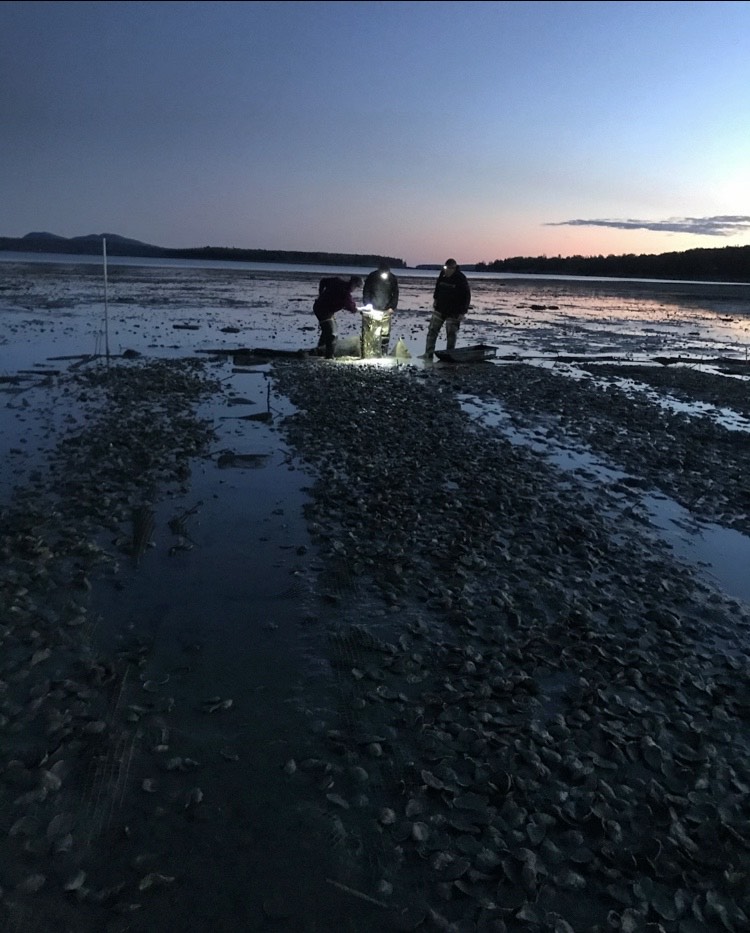

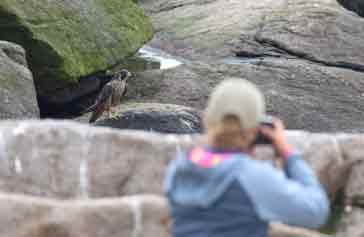 During the past two years, I have spent some time on one of the COA Islands, Mount Desert Rock. During the first summer out there, I immersed myself in the wildlife and followed around harbor and grey seals, herring and great lack-backed gulls, various shorebirds, falcons who were rare visitors, and anyone really who moved. My goal was to capture the life that a small rock in the middle of the Atlantic ocean offers. It was an amazing opportunity since every day the Rock became larger and larger, as I found more interesting behaviors to capture and stories to document. Just a few examples could be seeing a Spotted sandpiper hunting down a fly or hearing male Grey seals hauling in dusk. Also, being surrounded by the ocean, one has to be creative with repairs or new ideas. It was a wonderful experience to be limited by resources and be creative with existing materials we had on the Rock in order to build something useful for my project.
During the past two years, I have spent some time on one of the COA Islands, Mount Desert Rock. During the first summer out there, I immersed myself in the wildlife and followed around harbor and grey seals, herring and great lack-backed gulls, various shorebirds, falcons who were rare visitors, and anyone really who moved. My goal was to capture the life that a small rock in the middle of the Atlantic ocean offers. It was an amazing opportunity since every day the Rock became larger and larger, as I found more interesting behaviors to capture and stories to document. Just a few examples could be seeing a Spotted sandpiper hunting down a fly or hearing male Grey seals hauling in dusk. Also, being surrounded by the ocean, one has to be creative with repairs or new ideas. It was a wonderful experience to be limited by resources and be creative with existing materials we had on the Rock in order to build something useful for my project.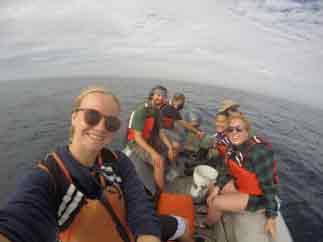 The second summer brought me back to the Rock but this time into a slightly different role — I interned as a co-station manager of the research station. Together with a fellow station-manager, we pioneered an experiment to build an “underwater camera trap” which actually was a buoy with an attached GoPro camera. We tried to capture footage of predatory fish around the Rock and did manage to see Pollock, Haddock, and diving Cormorants. We never got footage of our “target” species, Great White Shark, but we saw it swimming further away. An exciting project to continue! The summer also offered several learning experiences in leadership and offered so many good friendships. (PS – We have included another short video of Lenna’s at the end of this post.)
The second summer brought me back to the Rock but this time into a slightly different role — I interned as a co-station manager of the research station. Together with a fellow station-manager, we pioneered an experiment to build an “underwater camera trap” which actually was a buoy with an attached GoPro camera. We tried to capture footage of predatory fish around the Rock and did manage to see Pollock, Haddock, and diving Cormorants. We never got footage of our “target” species, Great White Shark, but we saw it swimming further away. An exciting project to continue! The summer also offered several learning experiences in leadership and offered so many good friendships. (PS – We have included another short video of Lenna’s at the end of this post.) Another opportunity to bridge science and media was in a class called Fisheries, Fishermen, and Fishing Communities where for my final project, I had a chance to follow a small segment of life of diadromous fish — elvers and Alewives crossing the Somesville dam. We were all connected with a local fisheries person and I met Rustin Taylor who taught me about the elver fishery and much more. It was really interesting to film elvers who had swam all the way from the Sargasso Sea and now climbed over a few meters tall dam wall, creating a mass that covered half of the concrete wall. I learned about resilience and dedication looking at these two species. (You can see the short video on Maine Sea Grant’s
Another opportunity to bridge science and media was in a class called Fisheries, Fishermen, and Fishing Communities where for my final project, I had a chance to follow a small segment of life of diadromous fish — elvers and Alewives crossing the Somesville dam. We were all connected with a local fisheries person and I met Rustin Taylor who taught me about the elver fishery and much more. It was really interesting to film elvers who had swam all the way from the Sargasso Sea and now climbed over a few meters tall dam wall, creating a mass that covered half of the concrete wall. I learned about resilience and dedication looking at these two species. (You can see the short video on Maine Sea Grant’s  Emma Ober ’20. Coming to COA, I started my education by exploring marine biology, something that I did not get a lot of exposure to growing up in Vermont. I found that I really loved the subject and have continued to delve deeper into ocean sciences throughout my time at COA. I completed an internship with Allied Whale during the summer between my first and second years. This involved working as a deckhand and research assistant on whale watch trips with Bar Harbor Whale Watch. I also got to spend half the summer on Mount Desert Rock, COA’s remote marine mammal research station. I loved living in the field and working with other researchers on ongoing studies as well as our own studies.
Emma Ober ’20. Coming to COA, I started my education by exploring marine biology, something that I did not get a lot of exposure to growing up in Vermont. I found that I really loved the subject and have continued to delve deeper into ocean sciences throughout my time at COA. I completed an internship with Allied Whale during the summer between my first and second years. This involved working as a deckhand and research assistant on whale watch trips with Bar Harbor Whale Watch. I also got to spend half the summer on Mount Desert Rock, COA’s remote marine mammal research station. I loved living in the field and working with other researchers on ongoing studies as well as our own studies.


 Aya Kumagai ’21. I am currently in Hakodate, a port city that is located on the southern tip of Hokkaido (northern most of the four main islands that makes Japan). I am working in a seabird-researching lab at Hokkaido University as my internship. I am part of a research project that is looking at how seabirds might be impacted by offshore windfarms. My personal project is about the flight height of Black-tailed gulls. The plan was to leave for an offshore filed site late this month (April), but this has been postponed due to the current pandemic. If I do get to go to the island (which I really hope!!), I will be tagging two different species of gulls with GPS loggers that can give us information on where the gulls have been and how high they were flying. I will be analyzing this data to see what might impact how high the gulls fly, and I will also be learning ways to create a sensitivity map of Black-tailed gulls for offshore windfarms. The plan is to take these findings and experience back to Maine and see what applies to the gulls that breed off the coast of Maine. Both Maine and Hokkaido are areas with great potential for offshore windfarms, but also has many seabird breeding islands. I am very excited to see what might apply between these two places.
Aya Kumagai ’21. I am currently in Hakodate, a port city that is located on the southern tip of Hokkaido (northern most of the four main islands that makes Japan). I am working in a seabird-researching lab at Hokkaido University as my internship. I am part of a research project that is looking at how seabirds might be impacted by offshore windfarms. My personal project is about the flight height of Black-tailed gulls. The plan was to leave for an offshore filed site late this month (April), but this has been postponed due to the current pandemic. If I do get to go to the island (which I really hope!!), I will be tagging two different species of gulls with GPS loggers that can give us information on where the gulls have been and how high they were flying. I will be analyzing this data to see what might impact how high the gulls fly, and I will also be learning ways to create a sensitivity map of Black-tailed gulls for offshore windfarms. The plan is to take these findings and experience back to Maine and see what applies to the gulls that breed off the coast of Maine. Both Maine and Hokkaido are areas with great potential for offshore windfarms, but also has many seabird breeding islands. I am very excited to see what might apply between these two places.

 My interest in seabirds started two summers ago when I visited Great Duck Island after my first year at COA. I was only on the island for a week, but I got to tag along with students that had projects out on the island. I got to see my first Leach’s Storm Petrel in Chole’s hand (a student that was on the island). It was like magic, and that moment, I decided that I wanted to spend my next summer on Great Duck Island researching petrels. The following summer that I spent on Great Duck Island was the best summer I have ever spent so far in my life. I investigated whether vegetation type influenced petrel burrow density and conducted a population estimate. Not only I got to practice filed-research skills (ex. using GPS units to map features, banding petrels, and taking field notes) and got the opportunity to present a poster at a conference, I also got to make many mistakes in a safe environment and learnt a lot of lessons (ex. data entry should happen every day while you can remember the details but also the importance of taking filed notes that you can read a year later and make sense out of it, string your field notes on to you so you don’t accidentally drop it when going through bushes, and more.) Sunsets were always different and beautiful, and I got to share those with friends and other creatures on the island. It was very special.
My interest in seabirds started two summers ago when I visited Great Duck Island after my first year at COA. I was only on the island for a week, but I got to tag along with students that had projects out on the island. I got to see my first Leach’s Storm Petrel in Chole’s hand (a student that was on the island). It was like magic, and that moment, I decided that I wanted to spend my next summer on Great Duck Island researching petrels. The following summer that I spent on Great Duck Island was the best summer I have ever spent so far in my life. I investigated whether vegetation type influenced petrel burrow density and conducted a population estimate. Not only I got to practice filed-research skills (ex. using GPS units to map features, banding petrels, and taking field notes) and got the opportunity to present a poster at a conference, I also got to make many mistakes in a safe environment and learnt a lot of lessons (ex. data entry should happen every day while you can remember the details but also the importance of taking filed notes that you can read a year later and make sense out of it, string your field notes on to you so you don’t accidentally drop it when going through bushes, and more.) Sunsets were always different and beautiful, and I got to share those with friends and other creatures on the island. It was very special.

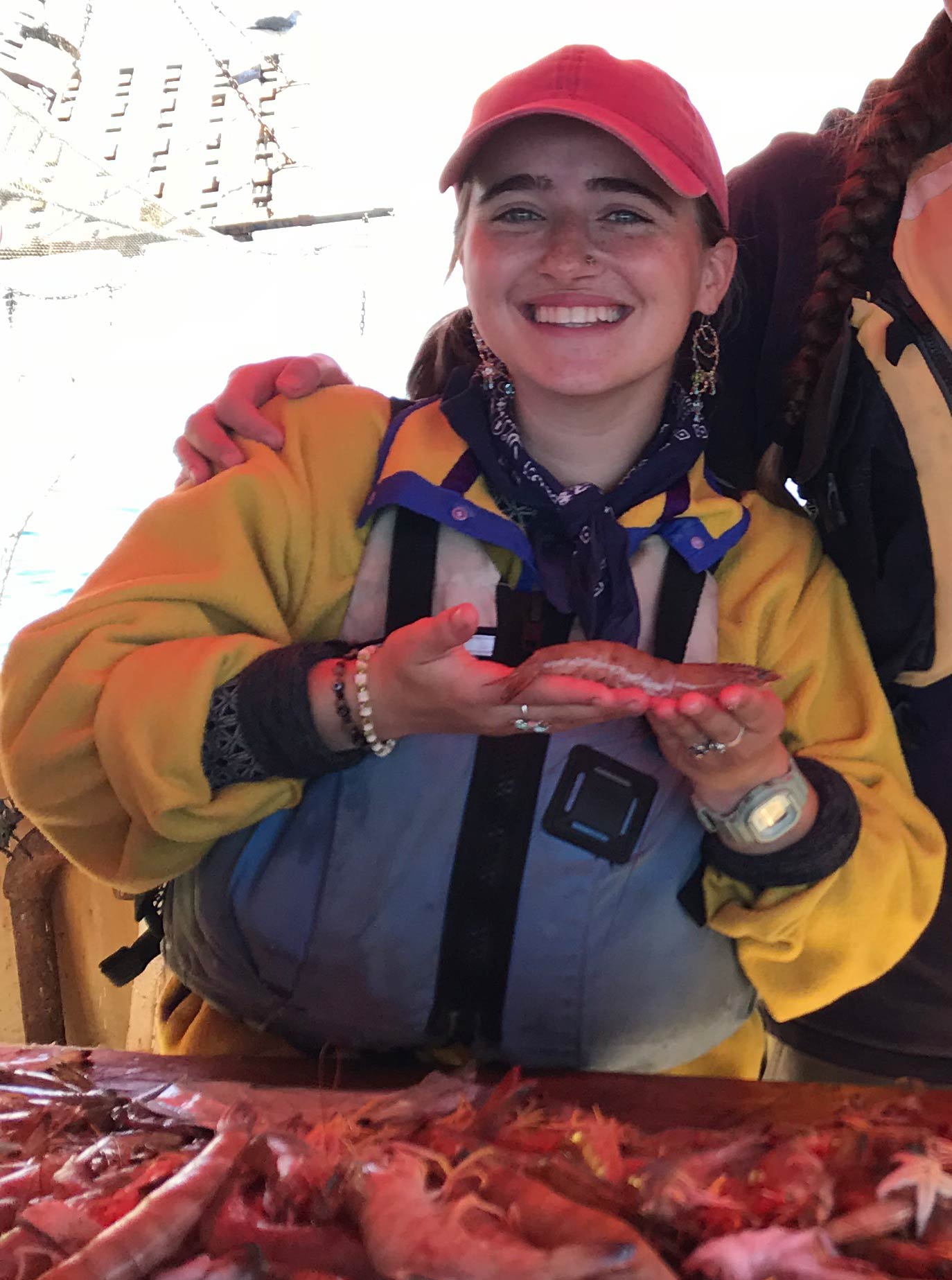
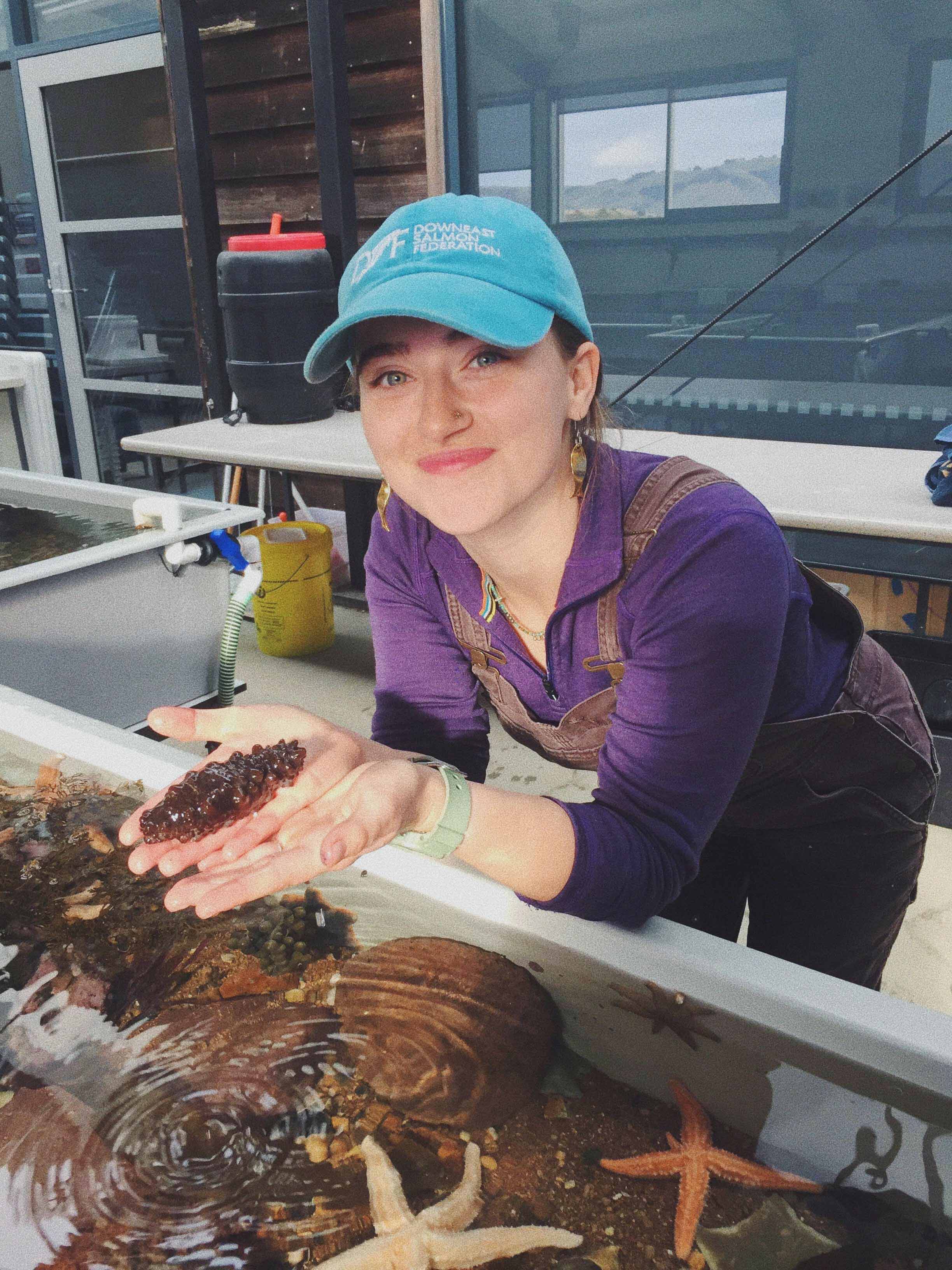 In the fall of my junior year I left the U.S. once again to study abroad, this time in New Zealand through a consortium agreement. I studied aquaculture, biological oceanography, and marine invertebrate ecology and biology at the University of Otago in Dunedin, New Zealand. This spring I am using each of these experiences to shape COA’s new Meat and Seafood Purchasing Policy which I am working on with two other students as a group independent study. In addition to working towards enacting policy change this year at an institutional level, I received a Maine Space Grant to work on a clam recruitment experiment and will be socially distancing on the mudflats this upcoming summer of 2020.
In the fall of my junior year I left the U.S. once again to study abroad, this time in New Zealand through a consortium agreement. I studied aquaculture, biological oceanography, and marine invertebrate ecology and biology at the University of Otago in Dunedin, New Zealand. This spring I am using each of these experiences to shape COA’s new Meat and Seafood Purchasing Policy which I am working on with two other students as a group independent study. In addition to working towards enacting policy change this year at an institutional level, I received a Maine Space Grant to work on a clam recruitment experiment and will be socially distancing on the mudflats this upcoming summer of 2020.